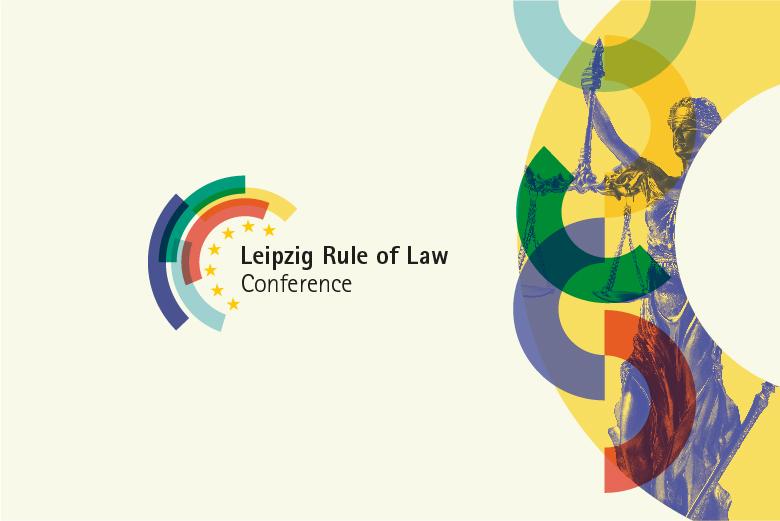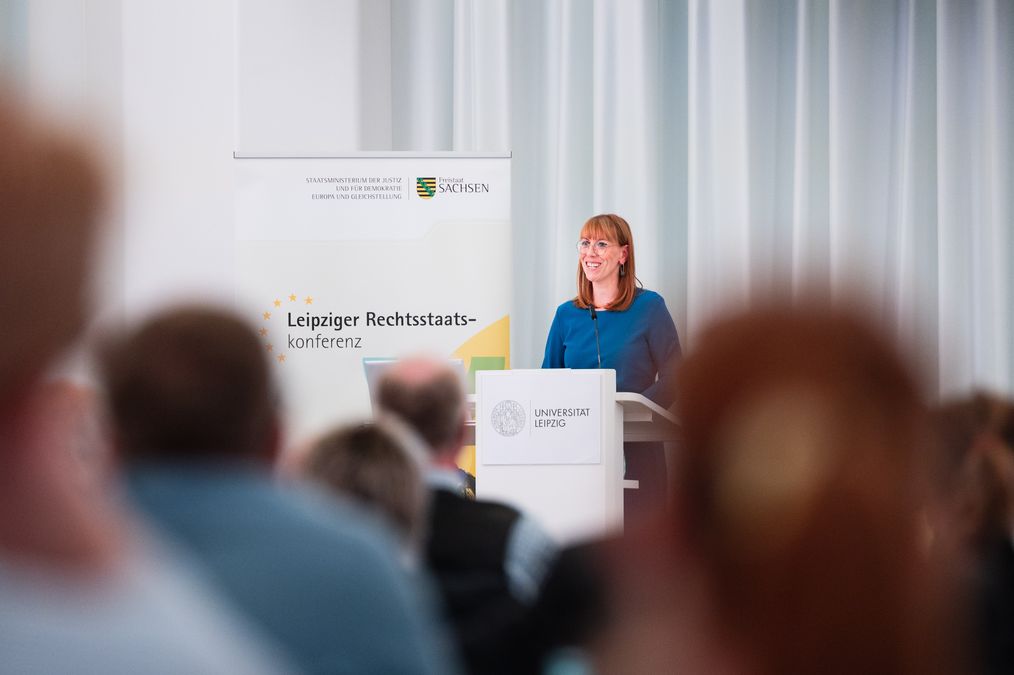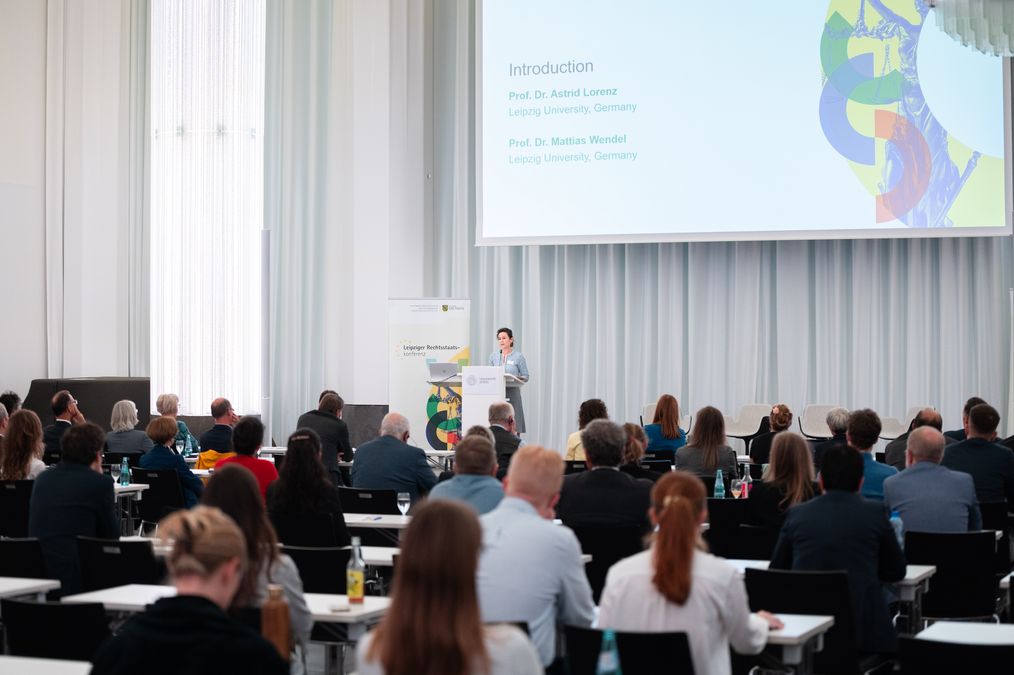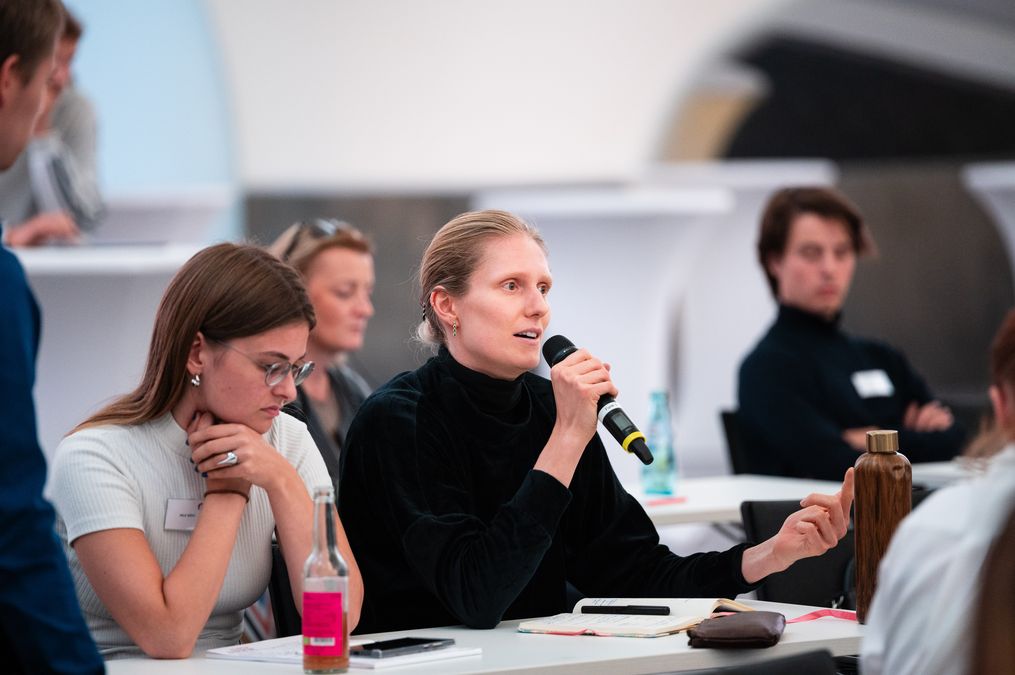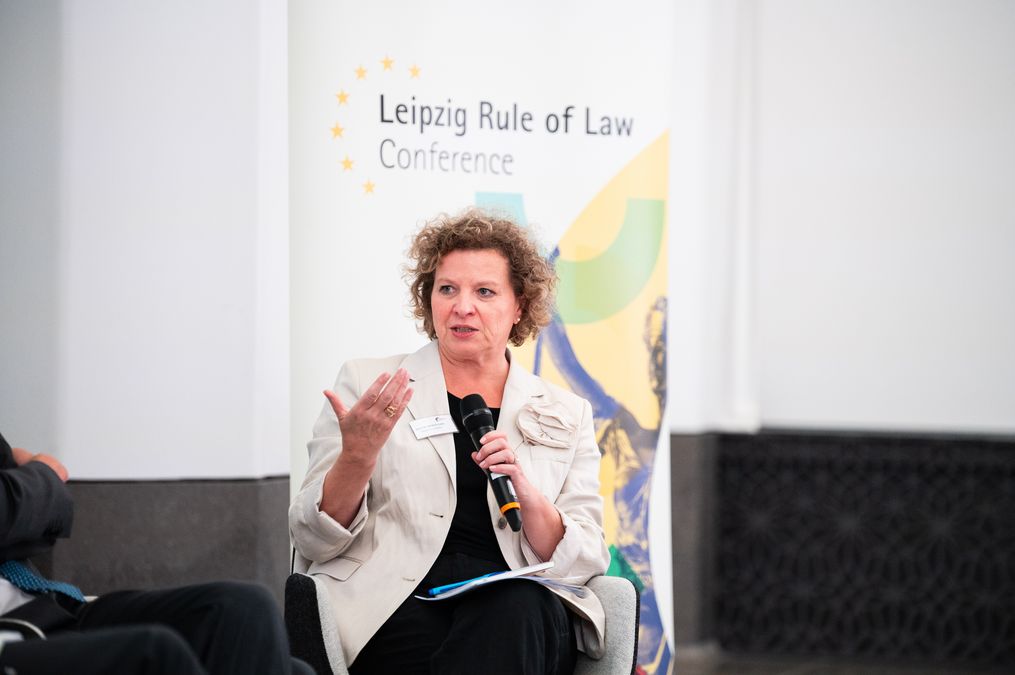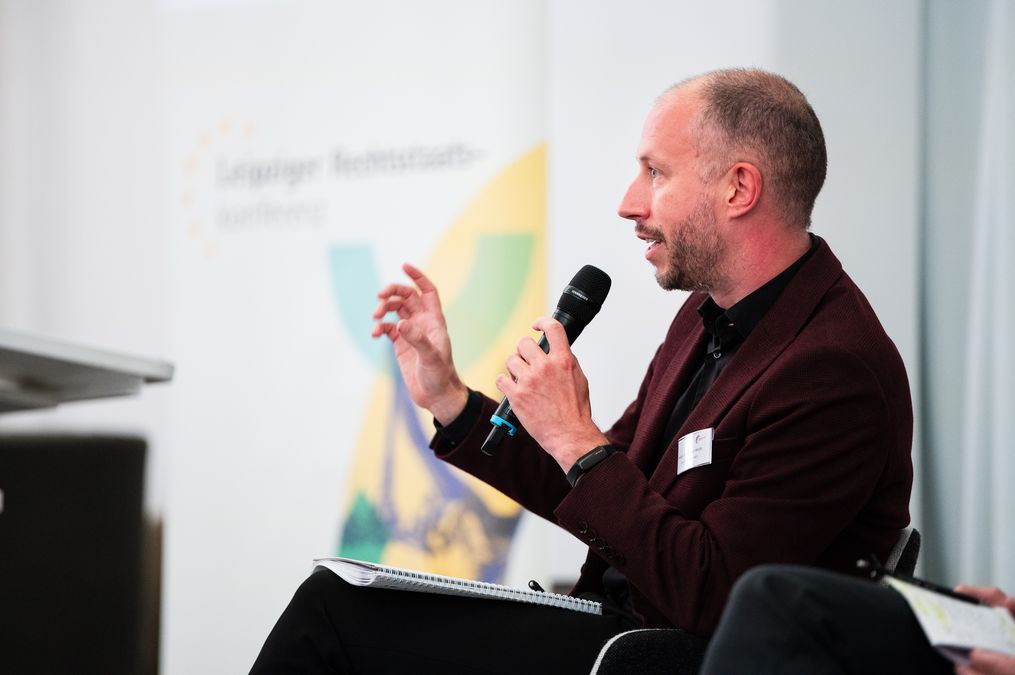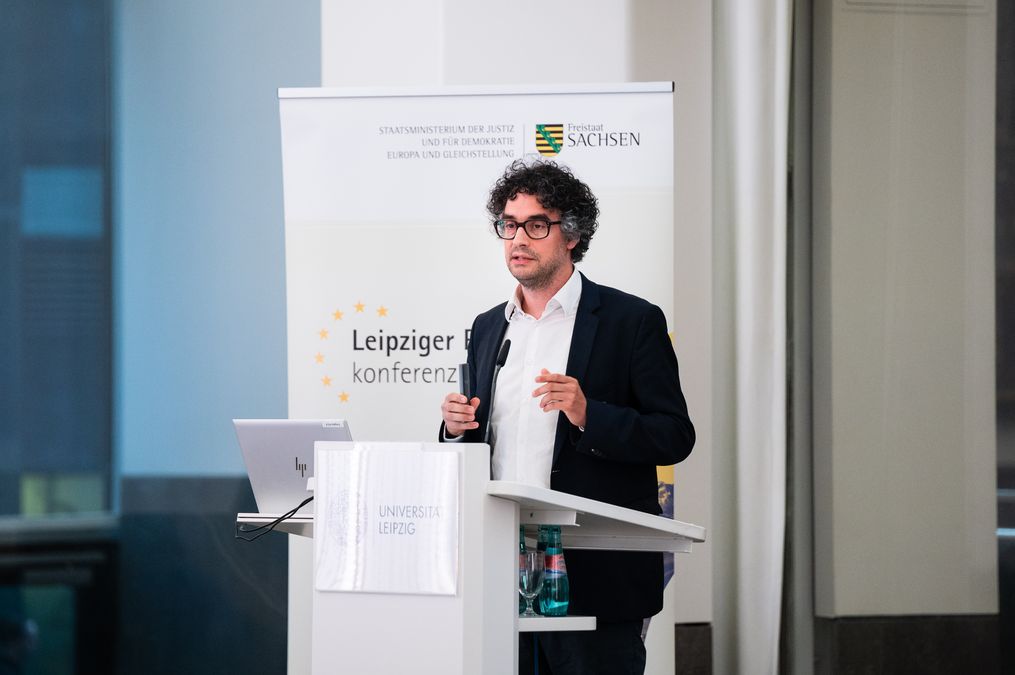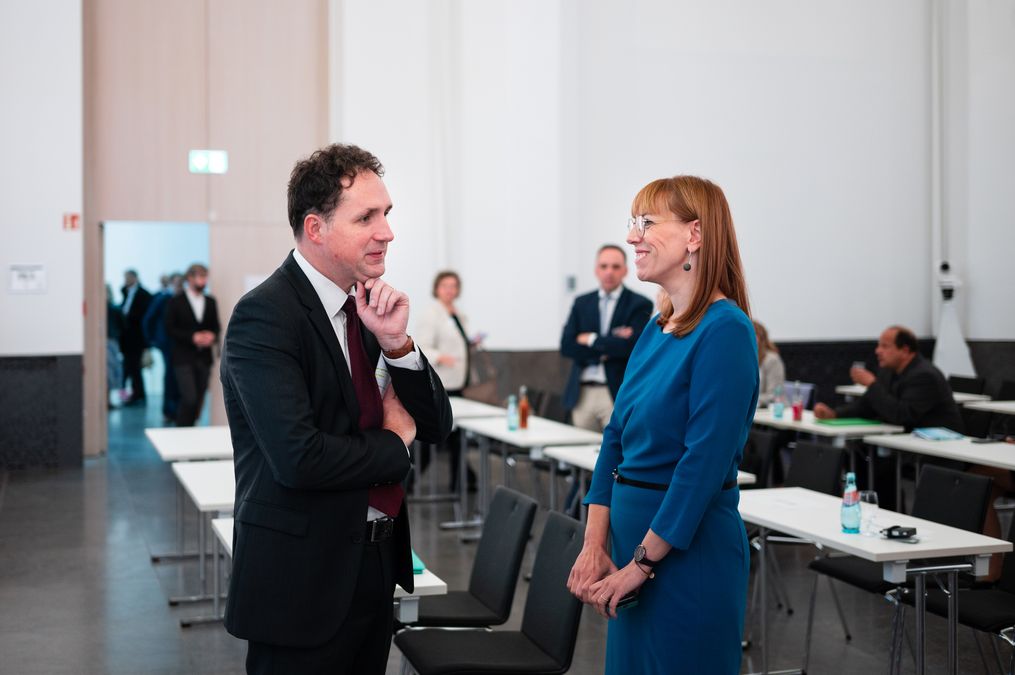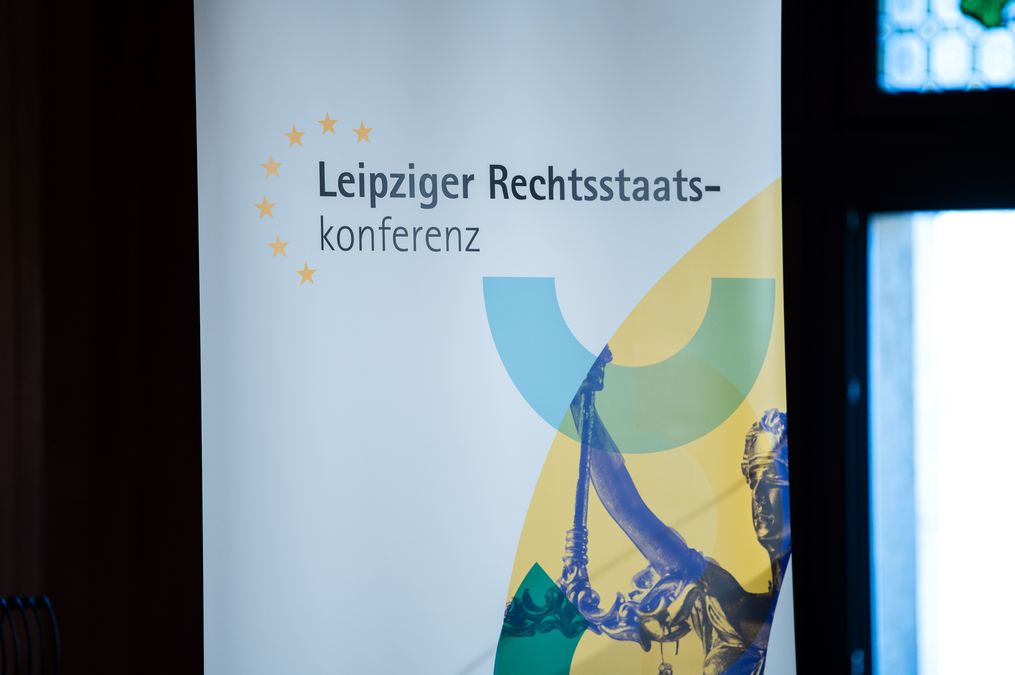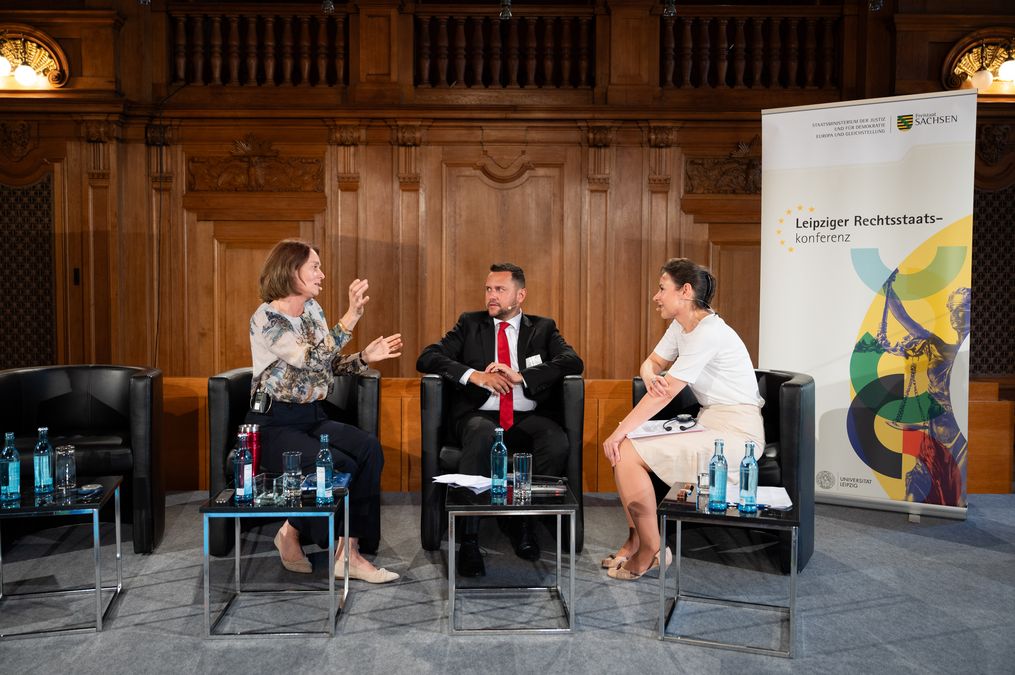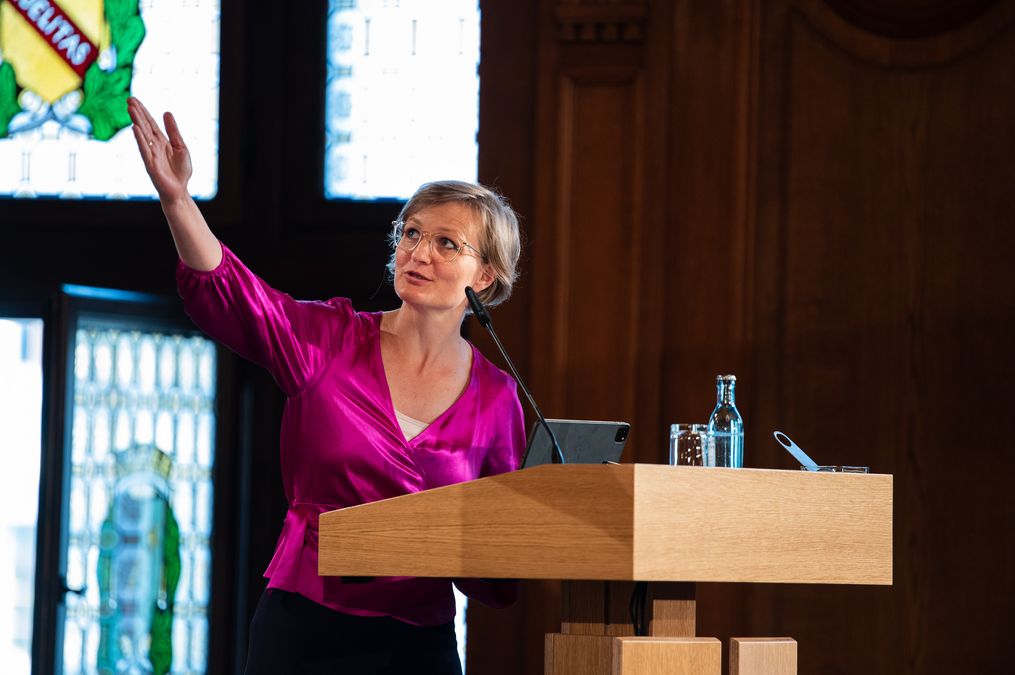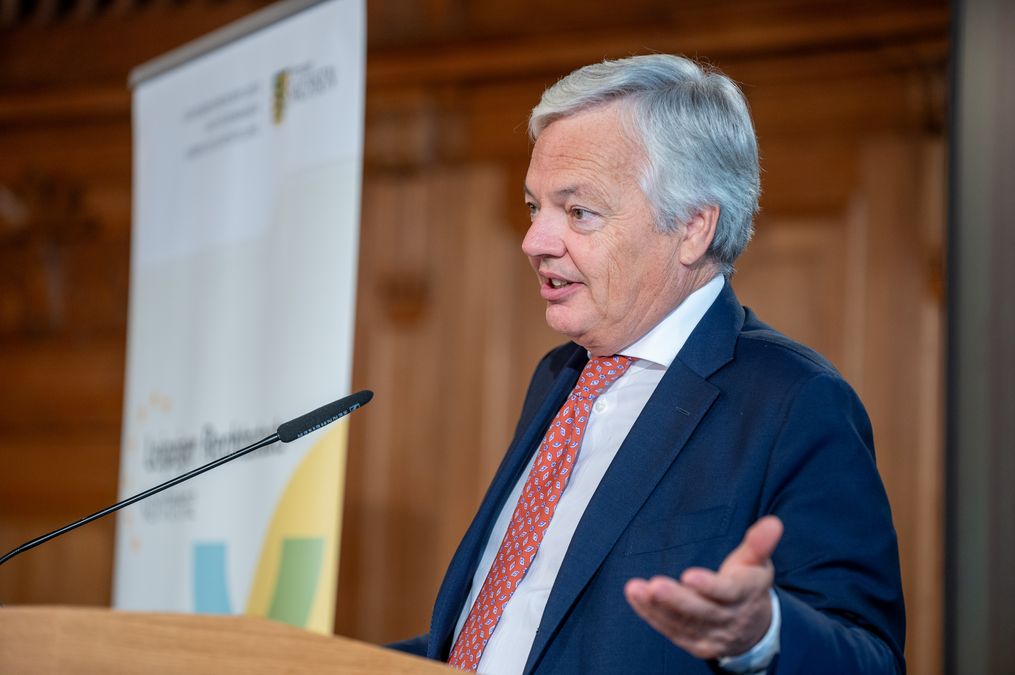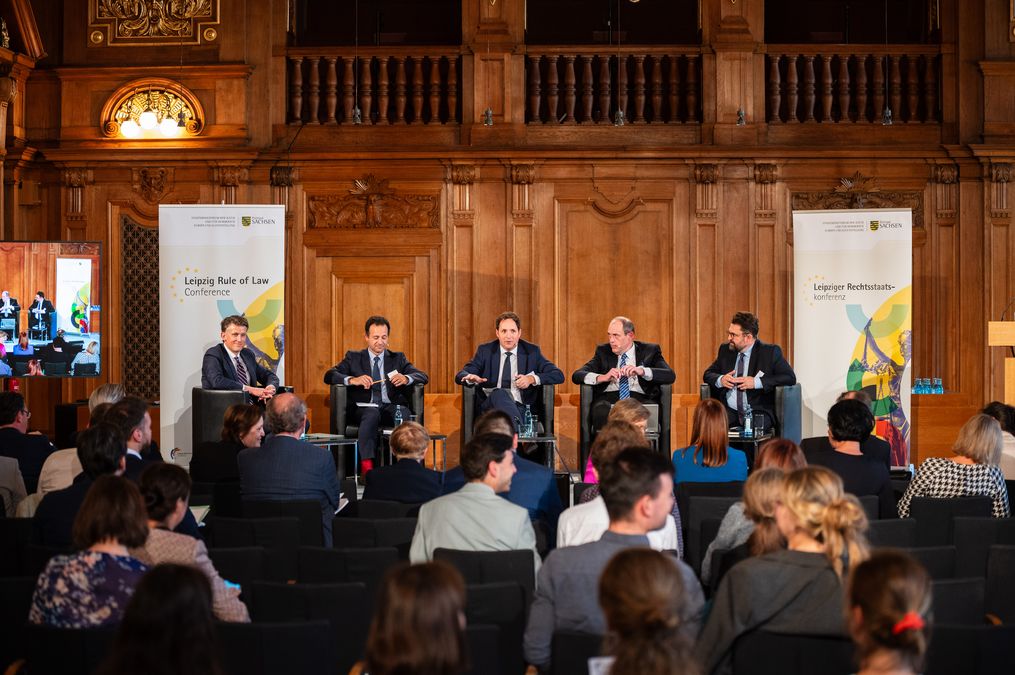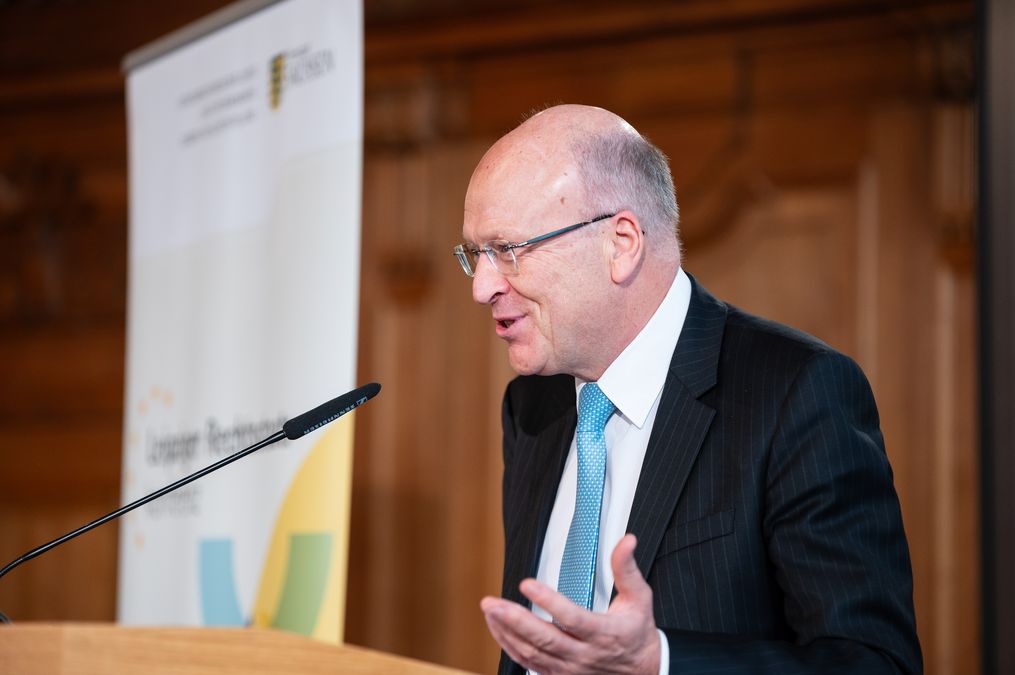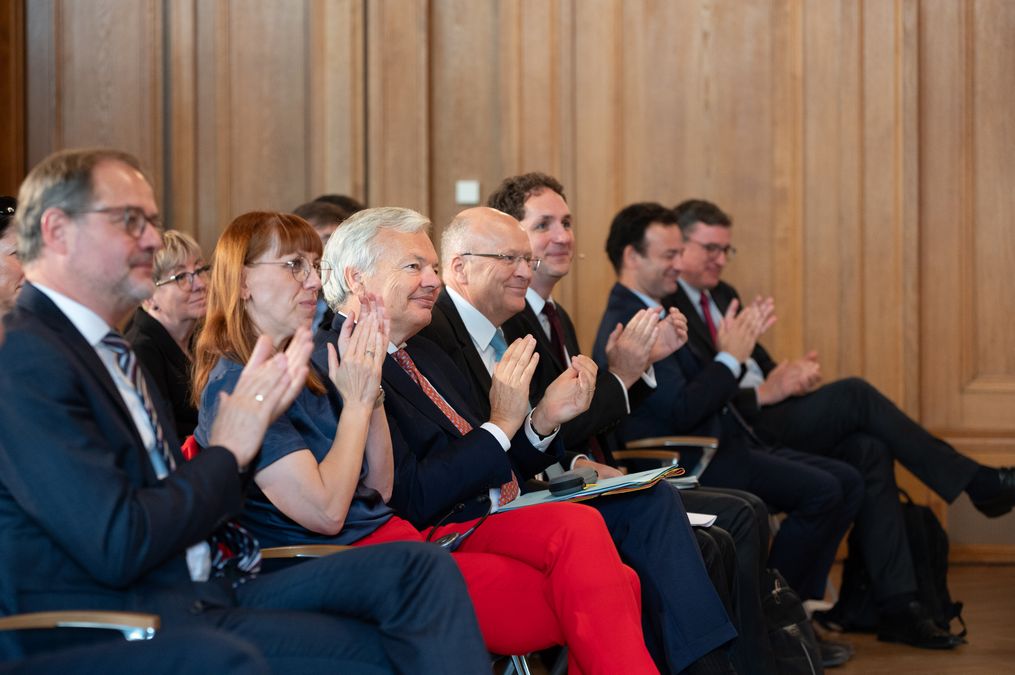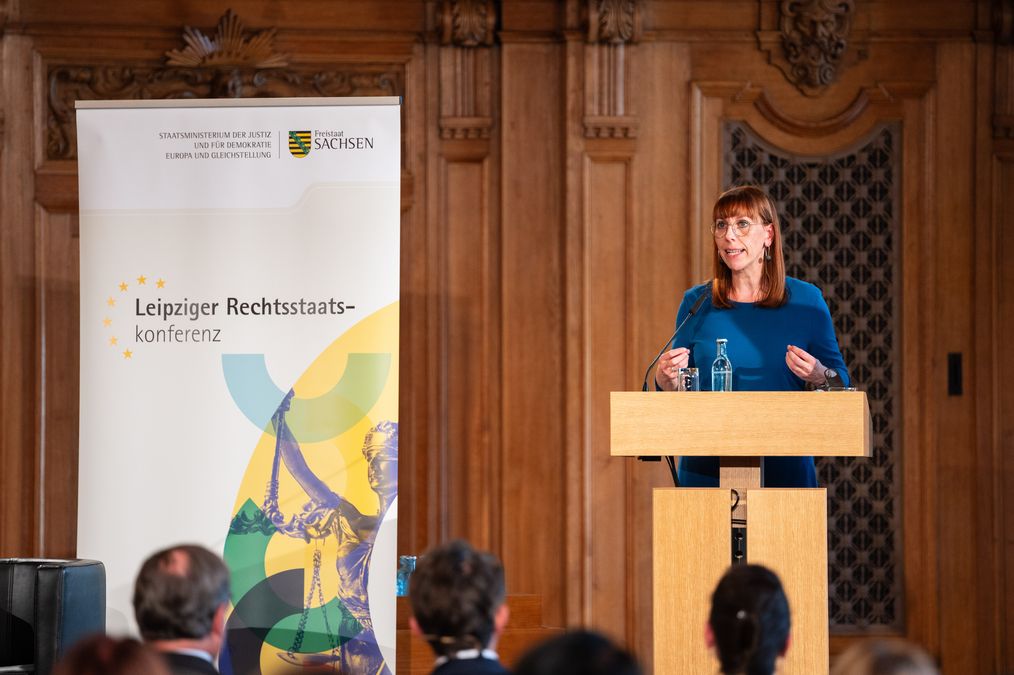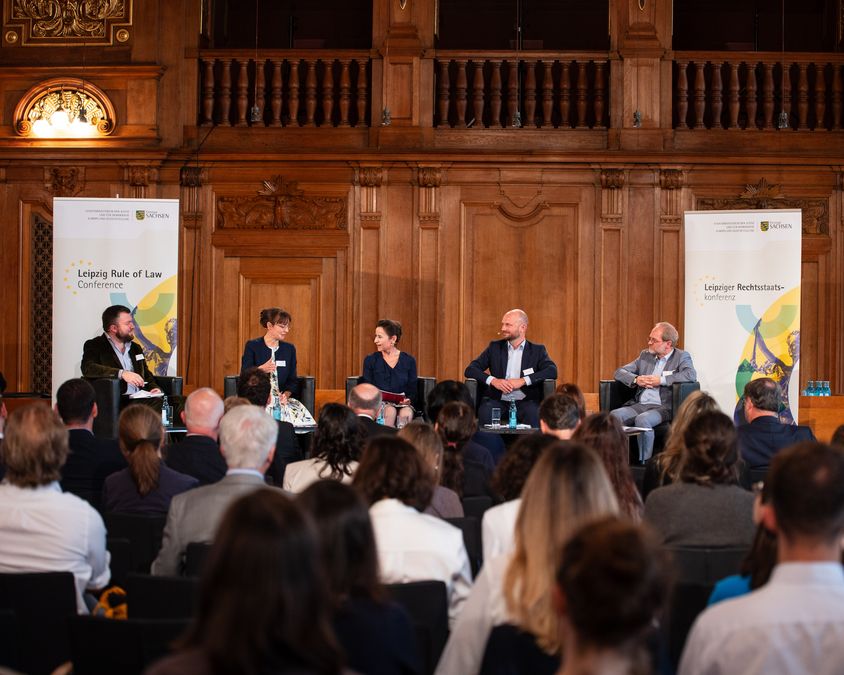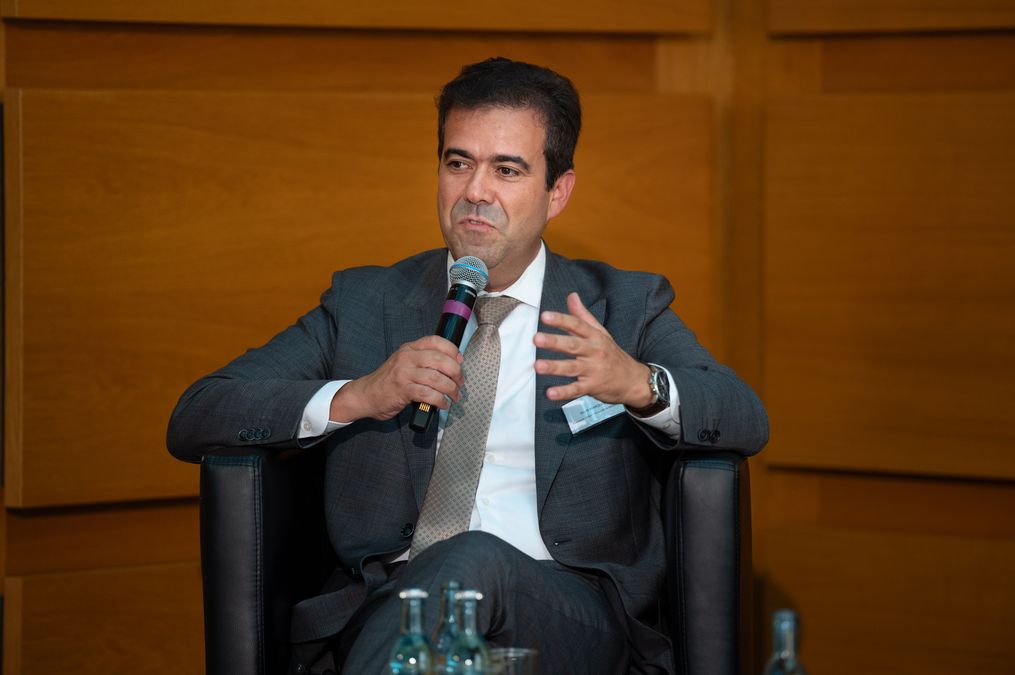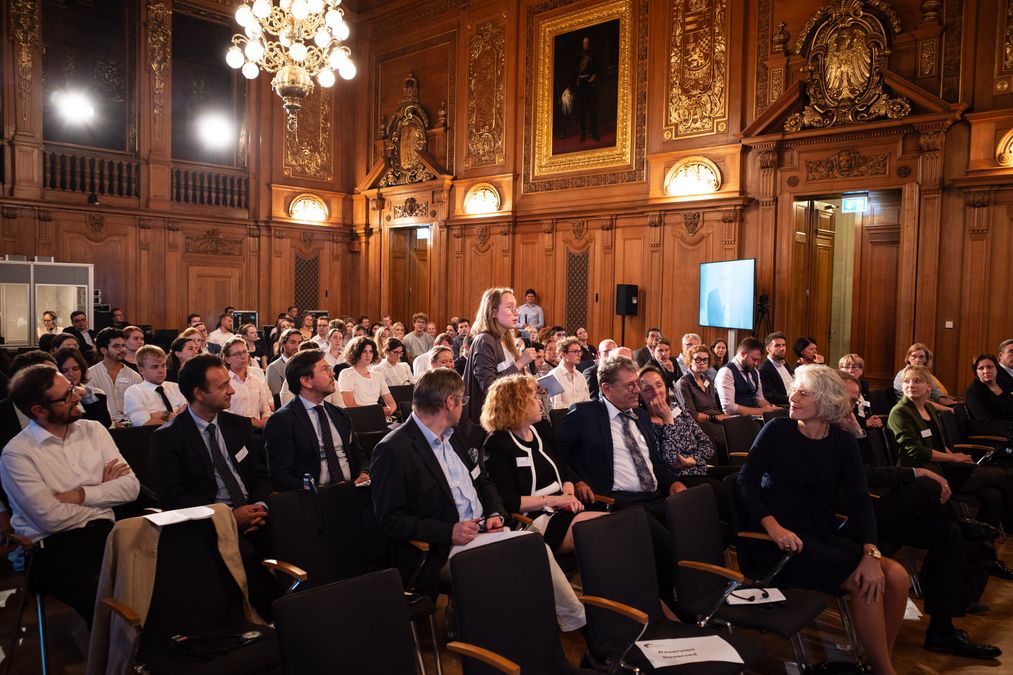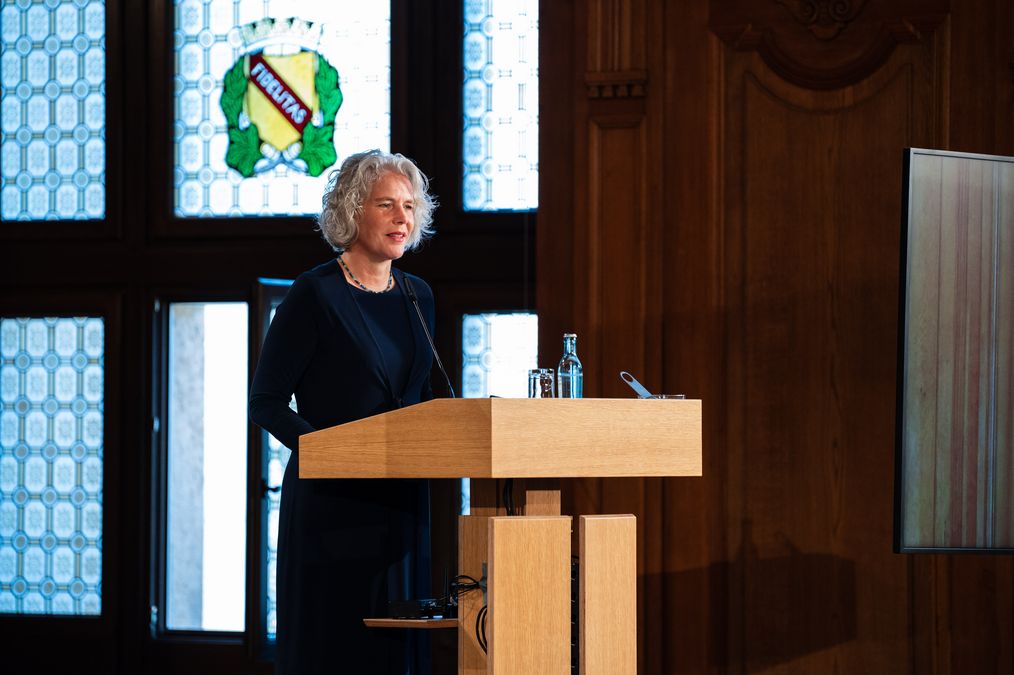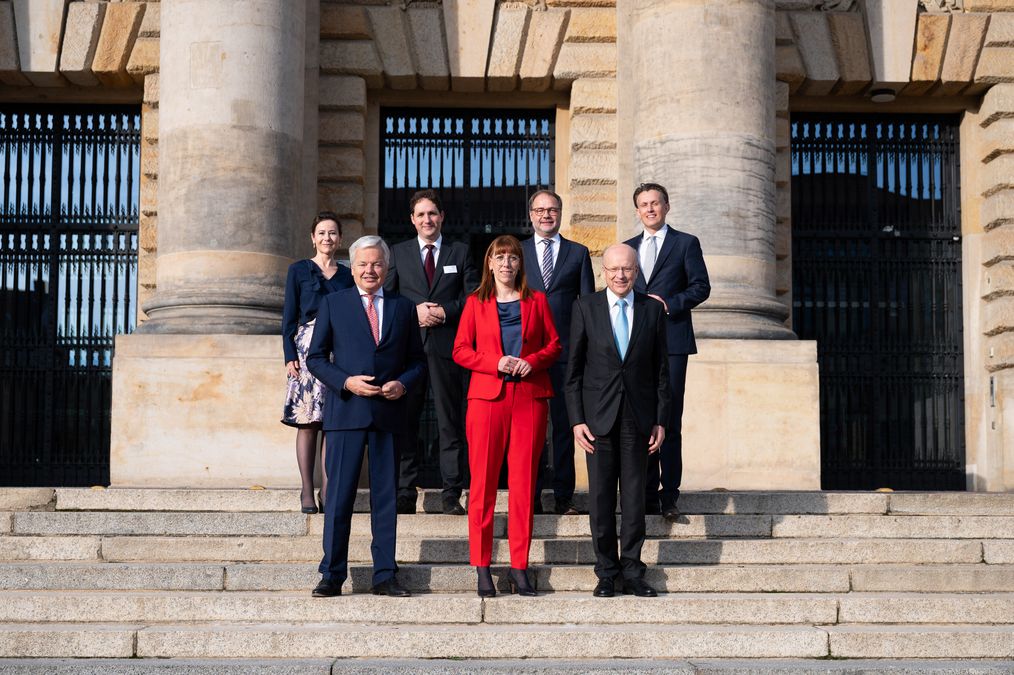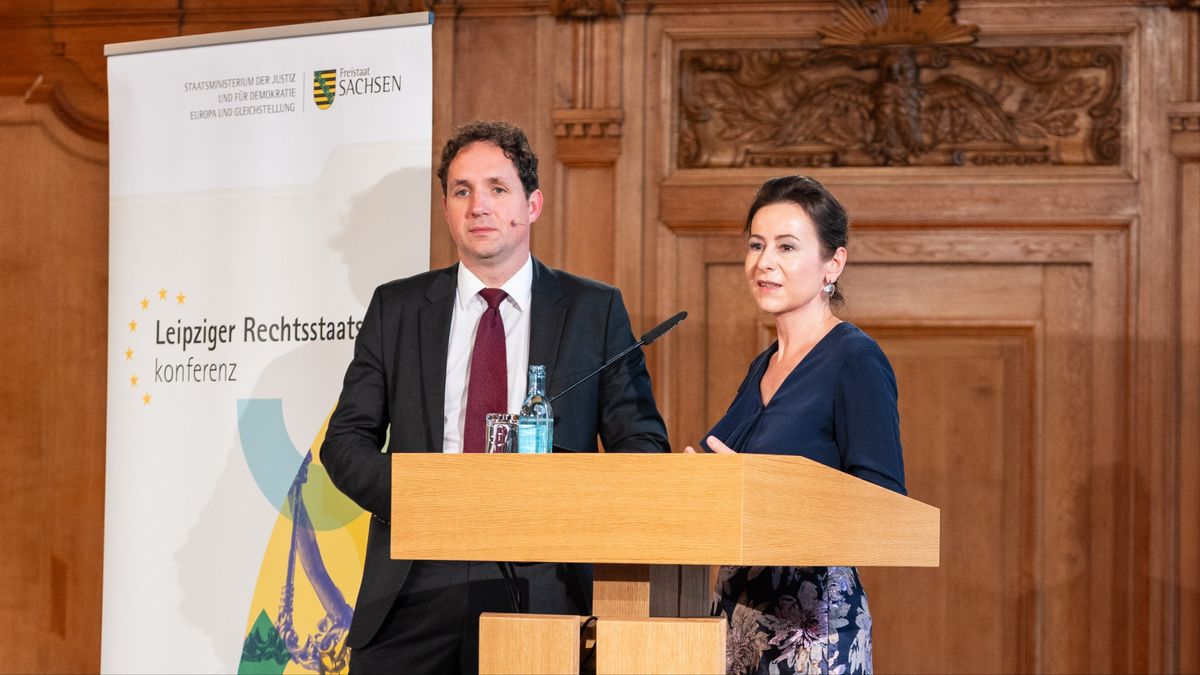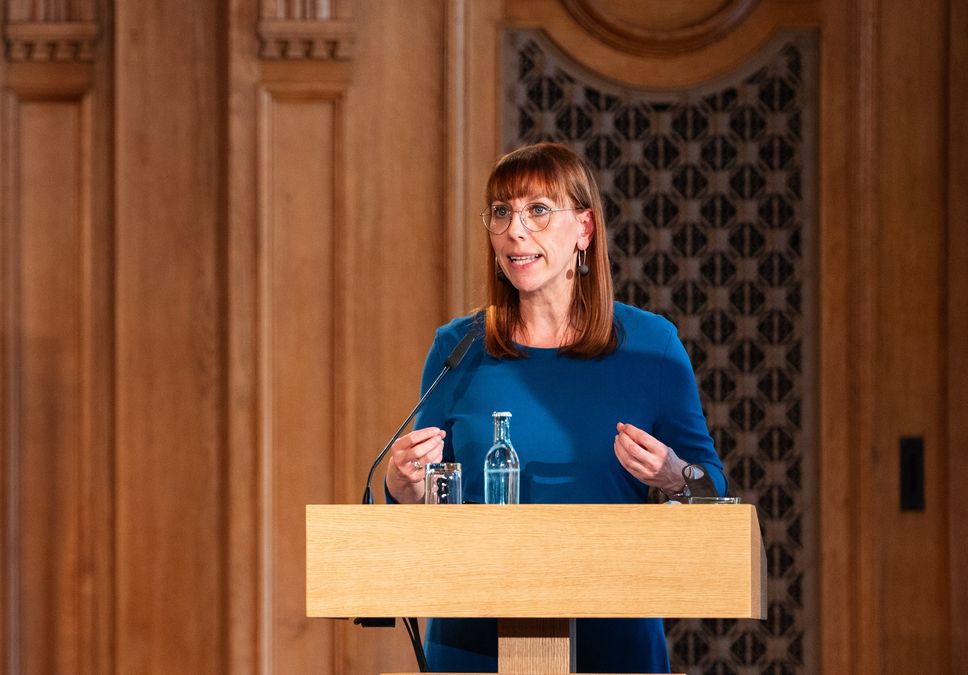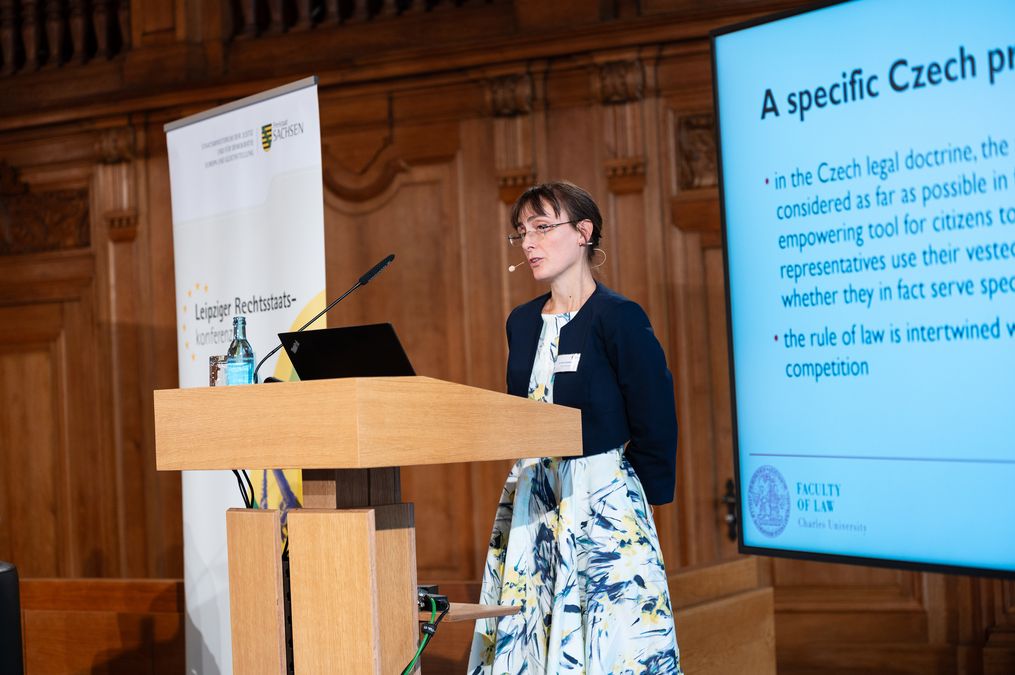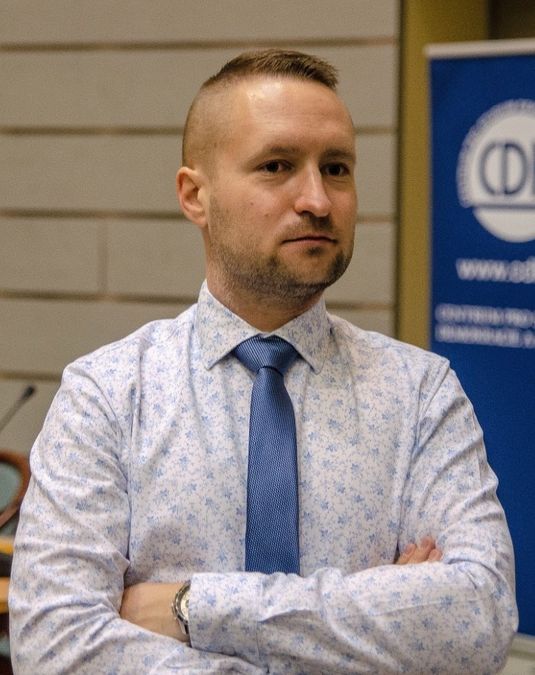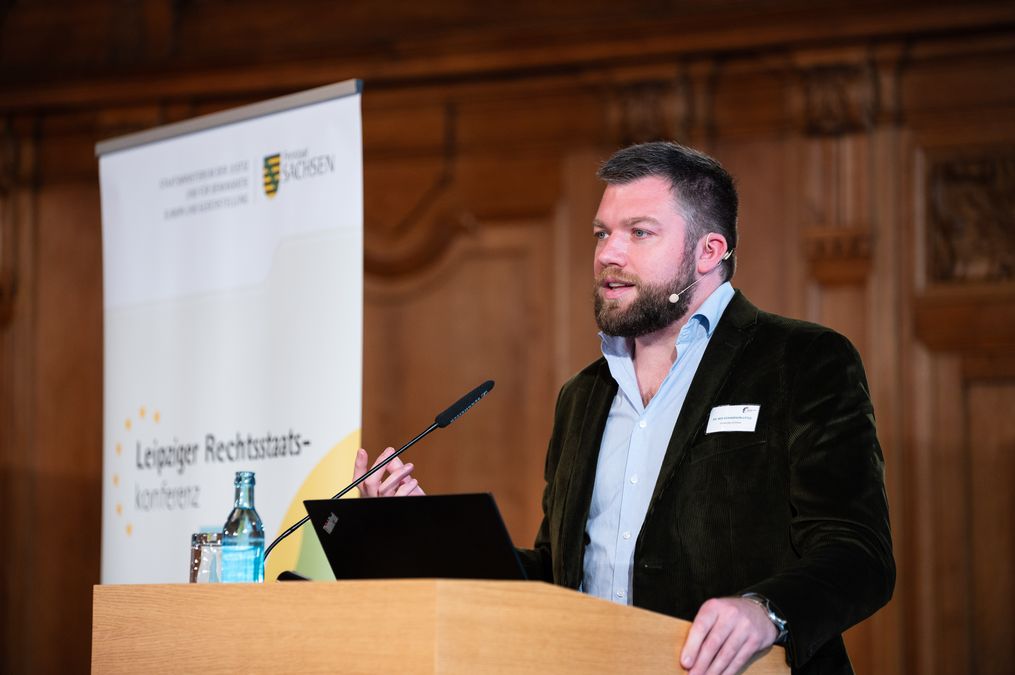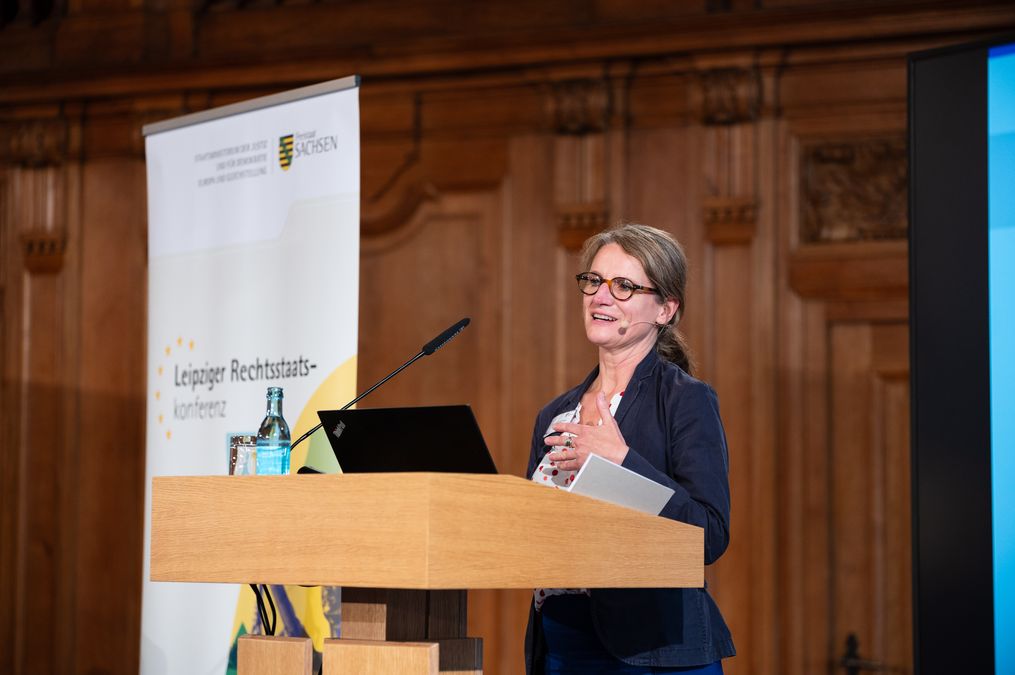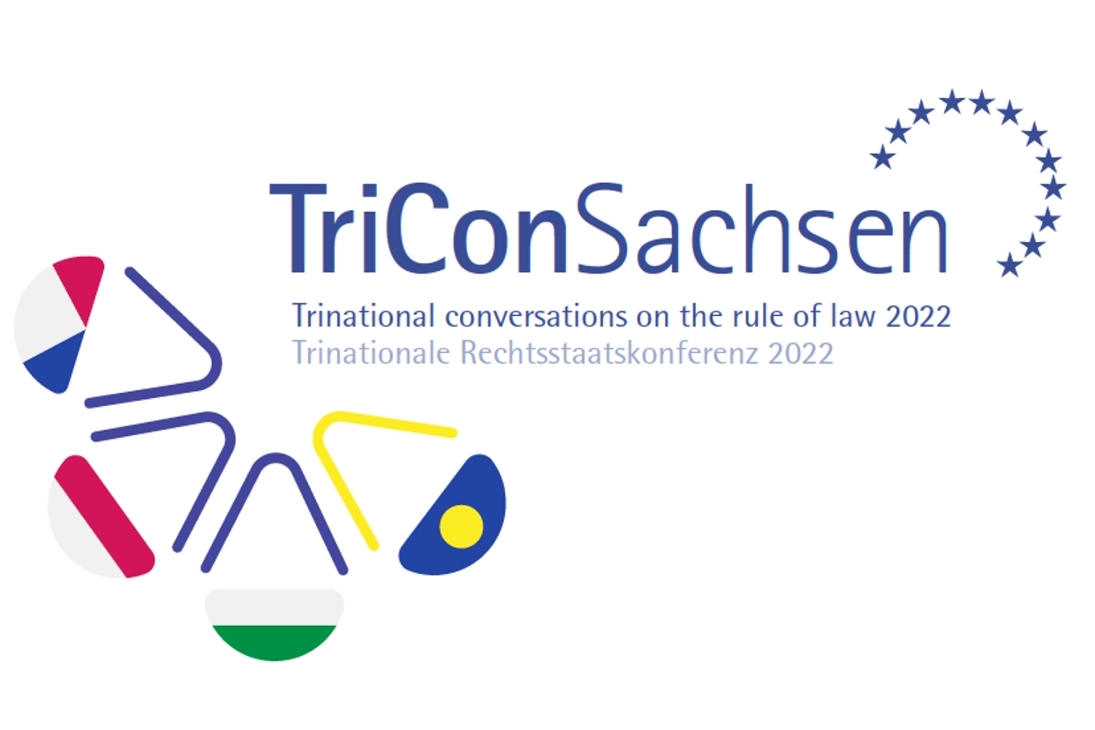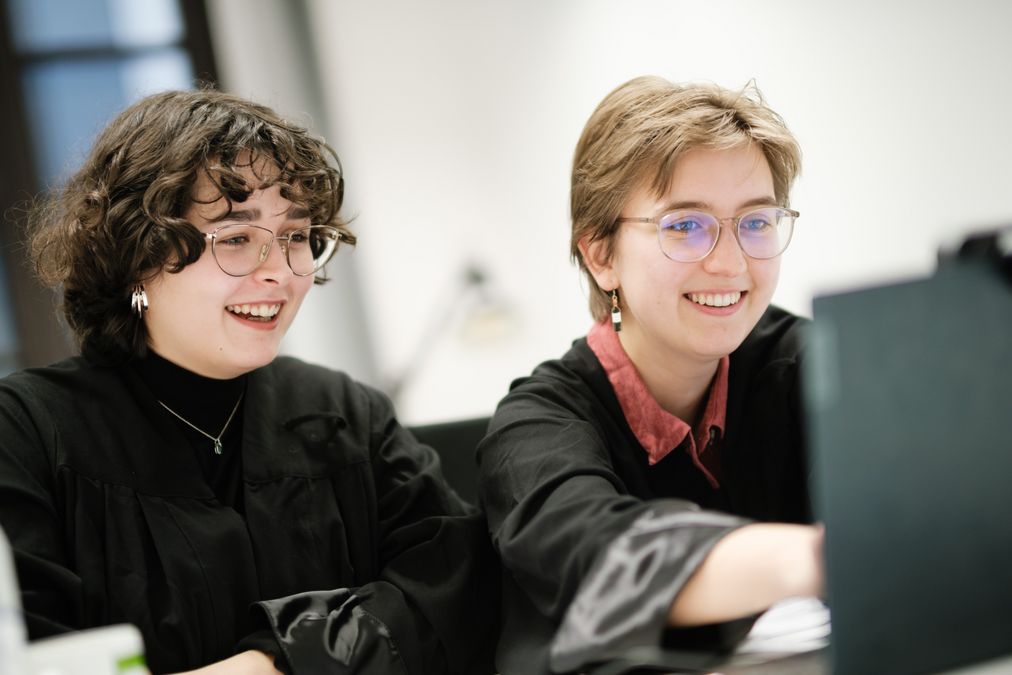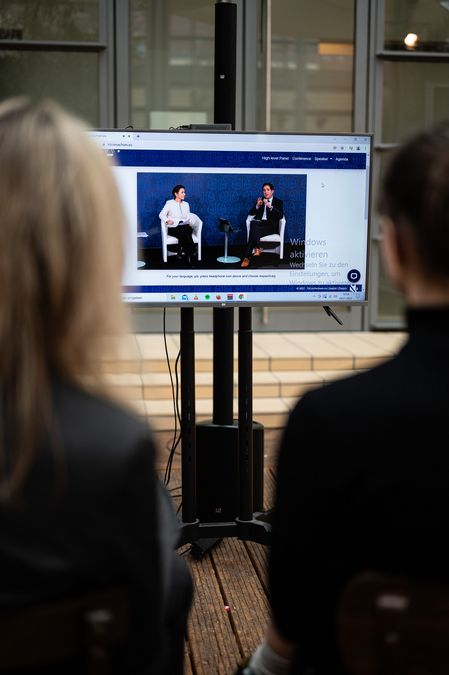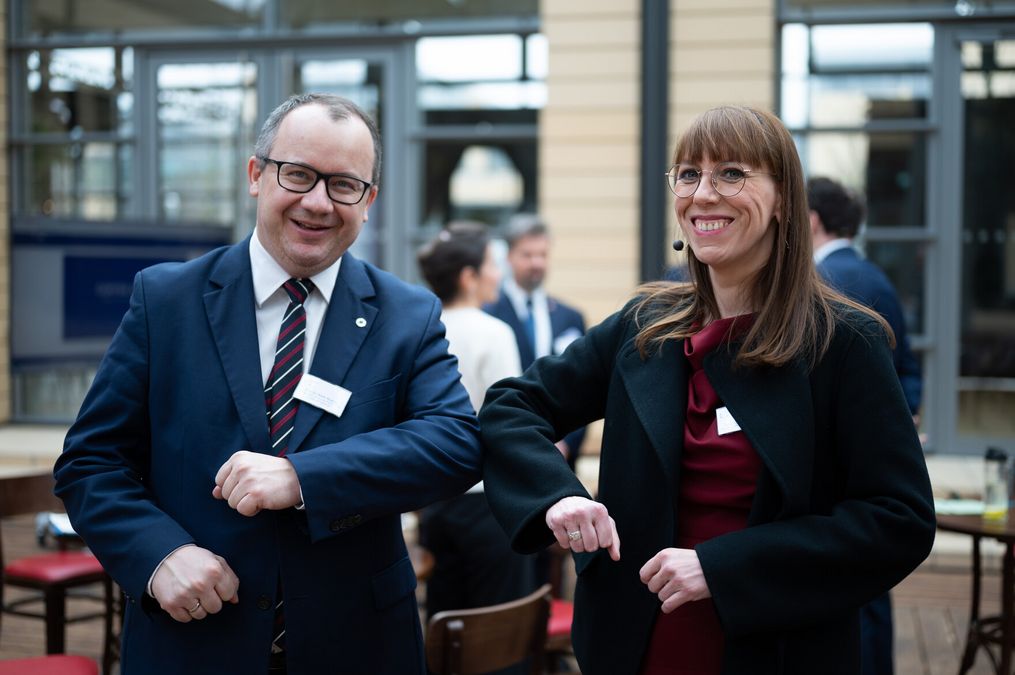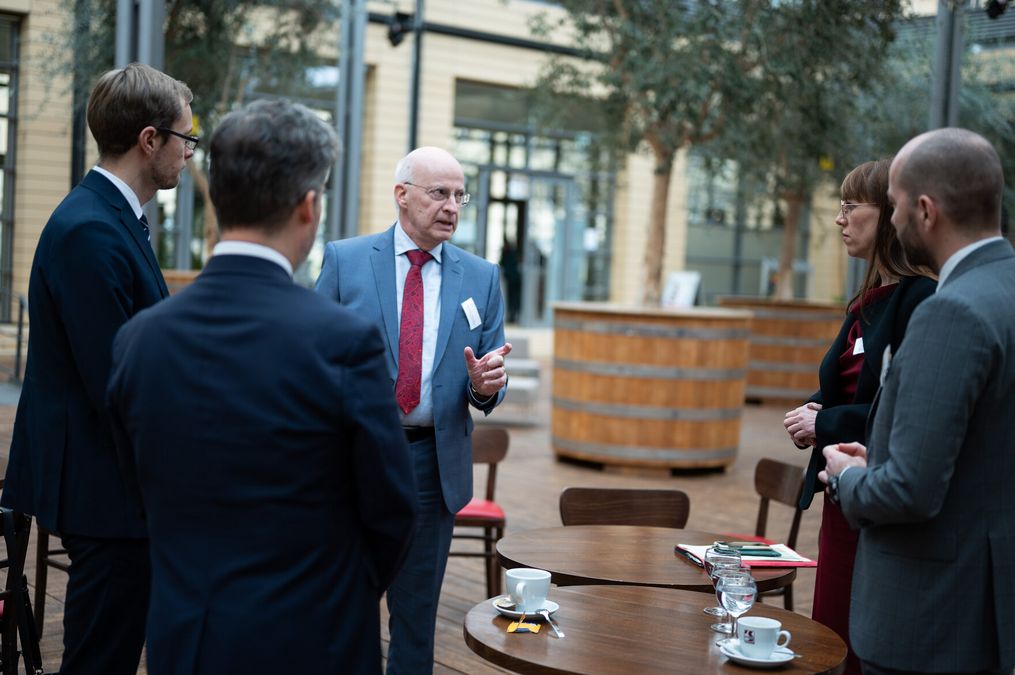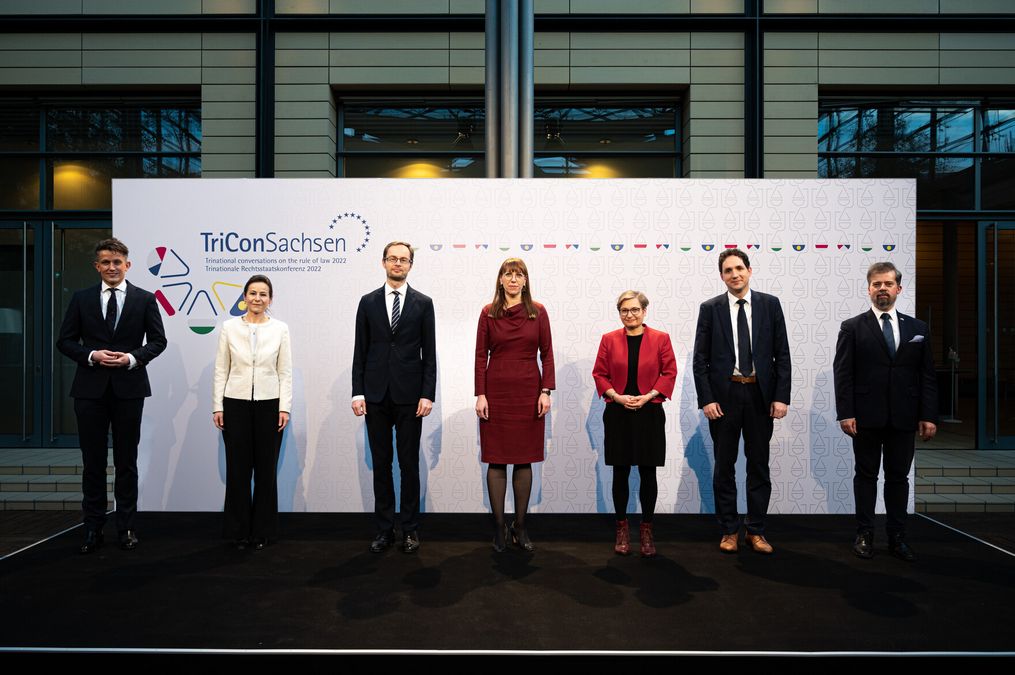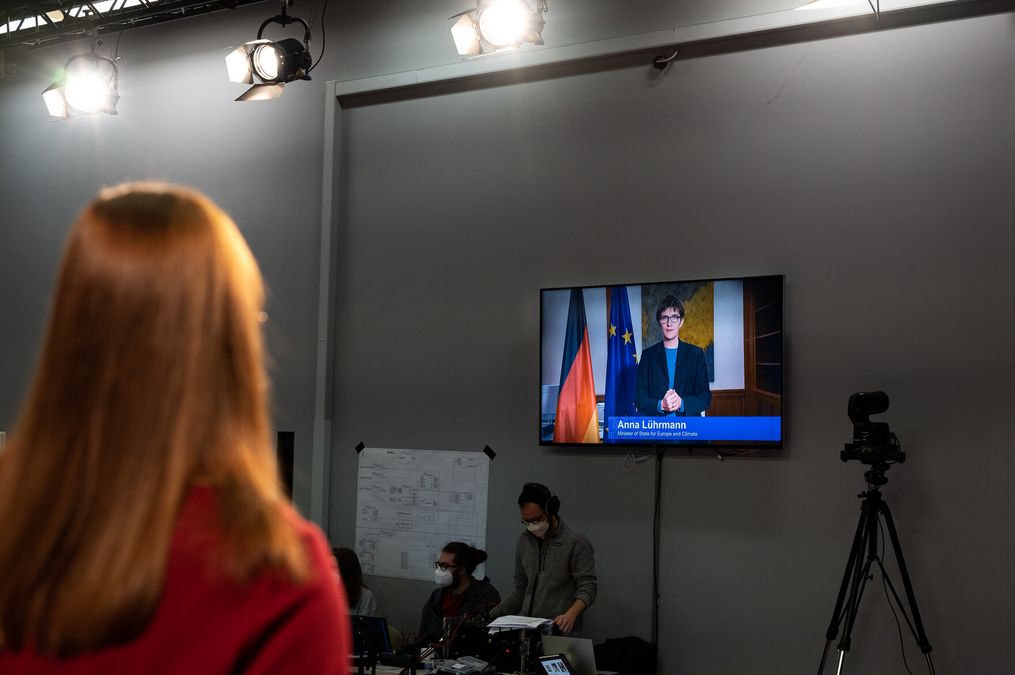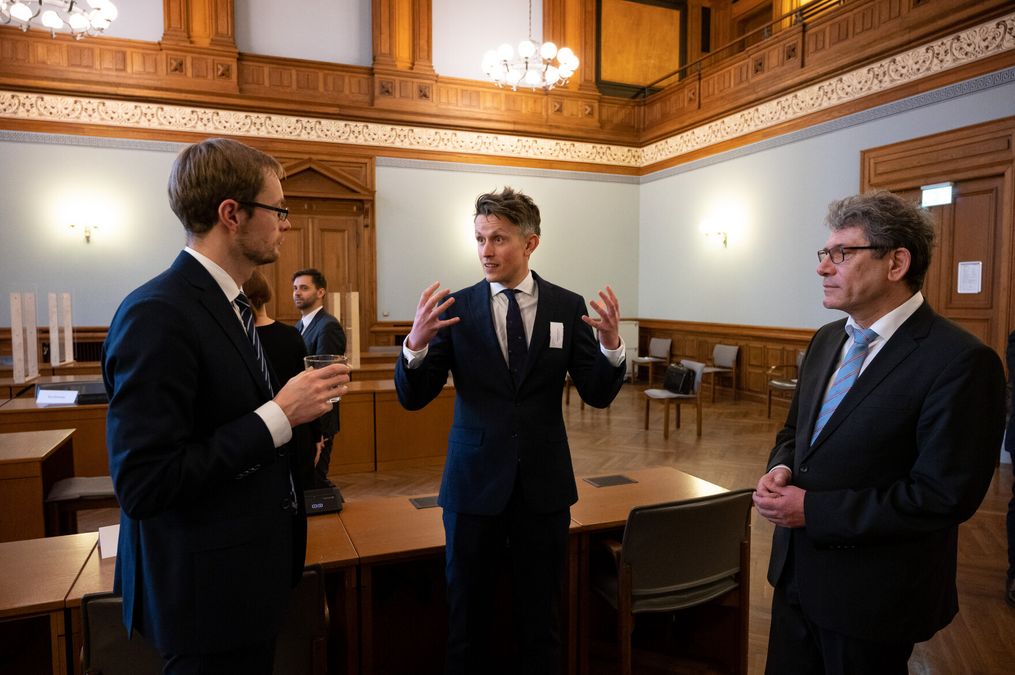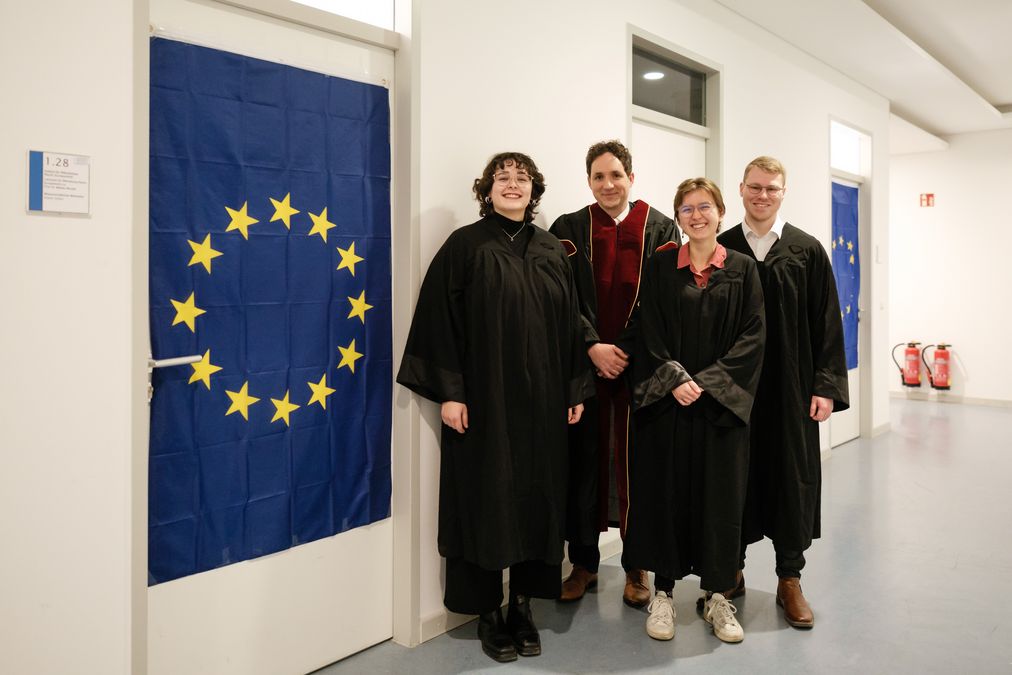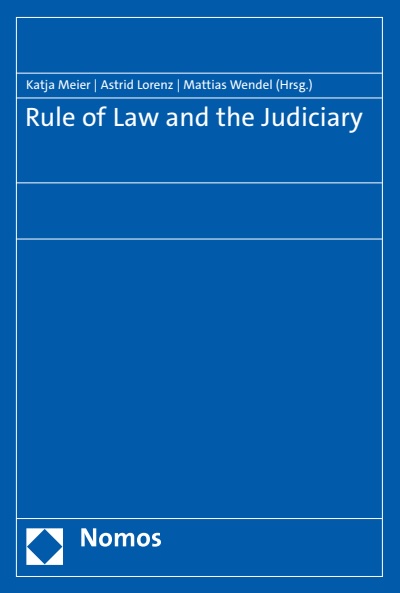Die Leipziger Rechtsstaatskonferenzen sind internationale Foren für den Austausch zur Rechtsstaatlichkeit in Europa, gemeinsam organisiert vom Sächsischen Staatsministerium der Justiz und für Demokratie, Europa und Gleichstellung, Prof. Dr. Astrid Lorenz von der Fakultät für Sozialwissenschaften und Philosophie und Prof. Dr. Mattias Wendel von der Juristenfakultät der Universität Leipzig.
Die Konferenzen tragen dazu bei, den Dialog über die Gemeinsamkeiten bei der Entwicklung der Rechtsstaatlichkeit aufrechtzuerhalten, ein gegenseitiges Verständnis für die Herausforderungen und potenziellen Bedrohungen der Rechtsstaatlichkeit zu schaffen und zu vertiefen sowie Wege zu deren Bewältigung und Zukunftsperspektiven zu erörtern.
Wir bringen rechts- und sozialwissenschaftliche Perspektiven zusammen, Personen aus Wissenschaft und Praxis – v. a. Politik, Justiz und NGOs – sowie aus verschiedenen Ländern. Auch Studierende sind beteiligt, darunter in Hintergrundgesprächen und 2023 im Rahmen einer internationalen Summer School.
Die Rechtsstaatlichkeit ist einer der Grundwerte der EU, der in Artikel 2 des Vertrags über die Europäische Union verankert ist. Als Rechtsgemeinschaft ist die Union darauf angewiesen, dass diese Werte von ihren Mitgliedstaaten geteilt und geachtet werden. In den letzten Jahren ist die Achtung der Rechtsstaatlichkeit auf nationaler Ebene zunehmend zu einem der dringlichsten Themen auf der EU-Agenda geworden.
2024 - A New Era of Rule of Law Challenges
26.09.2024 – 27.09.2024, Universität Leipzig, Paulinum – Aula.
2024 diskutierten wir über Gefahren für die Rechtsstaatlichkeit in alten EU-Mitgliedstaaten, wie die Rechtsstaatlichkeit im Zuge der nächsten EU-Erweiterung gesichert werden kann, wie (insbesondere in Anbetracht des Regierungswechsels in Polen) rechtsstaatliche Verhältnisse nach einer Regression wiederhergestellt werden können und ob Verfahren und Instrumente zur Sicherung der Rechtsstaatlichkeit geeignet sind. Erneut kamen bekannte Persönlichkeiten aus den Rechts- und Sozialwissenschaften und aus der politischen und juristischen Praxis zur Debatte zusammen. Prof. Piotr Girdwoyń, Direktor der Nationalen Schule für Justiz und Staatsanwaltschaft (NSSiP) in Polen, sprach beispielsweise über jüngste Änderungen in der Ausbildung, und Prof. Michal Bobek vom Obersten Verwaltungsgericht der Tschechischen Republik, ehemals Generalanwalt am Europäischen Gerichtshof, stellte die These auf, dass eine konzentrierte Verfassungsgerichtsbarkeit zu leicht politisch zu „kapern“ sein. Zivilgesellschaftliche Perspektiven auf Rechtsstaatlichkeit vertraten Kateryna Ryzhenko, stellvertretende Geschäftsführende Direktorin von Transparency International Ukraine, sowie Sándor Léderer, Direktor der Antikorruptions-NGO „K-Monitor” in Ungarn.
Day 1: 26.09.2024
12:45 - 13:00h: Musical Interlude on the Organ of the Paulinum, Ivo Mrvelj
----------------------------------------------------------------------------------------------------------------------------------------------------------------------------------------------
13:00-13:30h: Opening
• Welcome Speech: Katja Meier, Saxon State Minister of Justice and for Democracy, European Affairs and Gender Equality (Grußwort im Wortlaut als PDF)
• Introduction: Prof. Dr. Astrid Lorenz, Prof. Dr. Mattias Wendel, Leipzig University
----------------------------------------------------------------------------------------------------------------------------------------------------------------------------------------------
13:30 - 14:00h
• Keynote: Prof. Piotr Girdwoyń, Ph.D., National School of Judiciary and Public Prosecution of Poland, Director, Poland
----------------------------------------------------------------------------------------------------------------------------------------------------------------------------------------------
14:00 - 15:15h: Panel I: Turmoil in Old EU Member States – A New State of Rule of Law Regression?
Chair: Prof. Dr. Mattias Wendel, Leipzig University, Germany
• Prof. Dr. Monica Claes, Professor of European and Comparative Constitutional Law at Maastricht University, Netherlands
• Prof. Dr. Pieter de Wilde, University of Groningen, Faculty of Arts, Chair in European Politics & Society, Netherlands
• Prof. Dr. Pietro Faraguna, Associate Professor of Constitutional and Public Law at the University of Trieste, Italy
----------------------------------------------------------------------------------------------------------------------------------------------------------------------------------------------
15:15 - 15:30h Coffee Break
----------------------------------------------------------------------------------------------------------------------------------------------------------------------------------------------
15:30 - 16:30h Panel II: Safeguarding the Rule of Law in the Course of the Next EU Enlargement
Chair: PD Dr. Dietmar Müller, Leipzig University, Germany
• Petru Istrati, Member of the Justice Expert Group at the Institute for European Policies and Reforms, Moldova
• Dr. Marko Kmezić, Centre for Southeast European Studies, University of Graz, Austria
----------------------------------------------------------------------------------------------------------------------------------------------------------------------------------------------
16:30 - 17.00h Coffee Break
----------------------------------------------------------------------------------------------------------------------------------------------------------------------------------------------
17:00 - 18:00h Panel III: Mobilizing Civil Society – Strategies and Opportunities in the Fight for the Rule of Law
Chair: Madeleine Hartmann, Leipzig University, Germany
• Kateryna Ryzhenko, Deputy Executive Director of the NGO “Transparency International Ukraine”, Ukraine
• Sándor Léderer, Director of the Anti-corruption NGO “K-Monitor”, Hungary
----------------------------------------------------------------------------------------------------------------------------------------------------------------------------------------------
18:00 - 19:00h High Level Panel: Societies in Turmoil – Will Courts Rescue Democracy?
Chairs: Prof. Dr. Astrid Lorenz, Prof. Dr. Mattias Wendel, Leipzig University
• Prof. MMag. Michal Bobek, MJur (Oxon), Ph.D. (EUI), Dr.h.c., Supreme Administrative Court, formerly Advocate General at the European Court of Justice, Czech Republic
----------------------------------------------------------------------------------------------------------------------------------------------------------------------------------------------
19:00 - 20:00h Conference Reception
----------------------------------------------------------------------------------------------------------------------------------------------------------------------------------------------
Day 2: 27.09.2024
09:00 - 10:30h: Panel IV: Reestablishing the Rule of Law after Backsliding
Chair: Prof. Dr. Paweł Ireneusz Karolewski, Leipzig University
• Prof. MMag. Michal Bobek, MJur (Oxon), Ph.D. (EUI), Dr.h.c., Supreme Administrative Court, formerly Advocate General at the European Court of Justice, Czech Republic
• Prof. Wojciech Sadurski, Challis Professor in Jurisprudence, University of Sydney and Professor at the Centre for Europe, University of Warsaw, Poland
• Prof. Dr. Ellen Bos, Andrássy University Budapest, Centre for Democracy Studies, Hungary
----------------------------------------------------------------------------------------------------------------------------------------------------------------------------------------------
10:30 - 11:00h Coffee Break
----------------------------------------------------------------------------------------------------------------------------------------------------------------------------------------------
11:00 - 12:30h Panel V: Learning from the Rule of Law Crisis – Towards a European Democracy Toolbox
Chair: Dr. Robert Böttner, University of Halle-Wittenberg, Germany
• Prof. Dr. Ramona Coman, Université Libre de Bruxelles, Belgium
• Prof. Dr. Silvia von Steinsdorff, Humboldt University of Berlin, Institute of Social Sciences, Germany
• Friedemann Zippel, European Court of Auditors, Principal Manager, Chamber 2 Directorate, Investment for cohesion, growth and inclusion, Luxembourg
----------------------------------------------------------------------------------------------------------------------------------------------------------------------------------------------
12:30 - 13:00h Concluding Remarks
• Prof. Dr. Astrid Lorenz, Leipzig University
• Prof. Dr. Mattias Wendel, Leipzig University
Grußwort von Frau Staatsministerin Katja Meier zur Eröffnung der 3. Leipziger Rechtsstaatskonferenz „The Rule of Law. A New Era of Rule of Law Challenges“, 26. September 2024
Es gilt das gesprochene Wort.
Ich heiße Sie alle herzlich auf dieser dritten Leipziger Rechtsstaatskonferenz willkommen.
Letztes Jahr zur Eröffnung habe ich ein bisschen darüber nachgedacht, dass zuerst die Premiere kommt, beim zweiten Mal dann die Fortsetzung – und sich beim dritten Mal schon eine Art Tradition einstellt.
Eigentlich gefällt mir das Wort in diesem Zusammenhang nicht – denn „Tradition“, da denkt man an feste, starr gewordene Abläufe. Vielleicht auch ein bisschen an Innovationsfeindlichkeit.
Aber ich glaube, da besteht keine Gefahr. Die Leipziger Rechtsstaatskonferenz kennt zwar ein Dauerthema, aber sie kennt kein „business as usual“ – auch dank der tollen Gäste, die wir jedes Jahr einladen, und die auch diesmal wieder das Programm bestreiten. Dafür schon einmal vielen Dank!
Außerdem findet die Leipziger Rechtsstaatskonferenz dieses Jahr unter anderen Vorzeichen statt. Vor knapp vier Wochen haben im Freistaat Sachsen die Wahlen zum 8. Sächsischen Landtag stattgefunden; bereits im Juni haben wir alle ein neues Europa-Parlament gewählt.
Wenn der politische Mehrheitswille dabei derart nach rechts driftet, dann sind das keine guten Nachrichten für Demokratie und Rechtsstaatlichkeit. Und das betrifft uns als Europäerinnen und Europäer genauso wie als Sächsinnen und Sachsen.
Viele Menschen schenken ihr Vertrauen politischen Kräften, mit deren Demokratie-Festigkeit es nicht weit her ist. Wir erleben, dass der Populismus mit seinen autoritären und nationalistischen Erzählungen verfängt, und um dem etwas entgegenzusetzen, brauchen wir keine nationalen
Alleingänge, kein Säbelrasseln und auch keine Symbolpolitik mit verschärften Grenzkontrollen – denn all das verträgt sich in meinen Augen nicht mit der europäischen Idee.
Gegen rigides Grenzdenken war von Anfang an auch diese Leipziger Rechtsstaatskonferenz gerichtet – und deshalb finde ich es schön, dass sie jetzt, nur wenige Wochen nach den Landtagswahlen, wieder stattfindet.
Das Motto in diesem Jahr lautet: „Eine neue Ära der Herausforderungen für die Rechtsstaatlichkeit“, und diese Überschrift ist natürlich aktuellen Entwicklungen geschuldet.
Rechtsstaatlichkeit war und ist einer der zentralen Werte, auf denen die gesamte Idee einer Europäischen Union fußt. Deshalb ist es einfach nur erschreckend, wie sehr dieser Grundwert heute selbst in einigen Mitgliedsstaaten missachtet wird – und wie damit auch seine Erosion voranschreitet.
Vor wenigen Jahren haben die beiden US-amerikanischen Politologen Steven Levitzky und Daniel Ziblatt eine Untersuchung mit dem aufrüttelnden Titel „How Democracies Die“ (2018) vorgelegt.
Darin kommen die beiden Autoren zu dem Schluss, dass die meisten demokratischen Zusammenbrüche seit dem Ende des Kalten Krieges nicht durch Armeen, nicht durch Soldaten und Generäle verursacht worden sind, sondern durch gewählte Regierungen.
Zugespitzt heißt es in der Studie:
„Democratic backsliding today begins at the ballot box“, die Erosion der Demokratie beginnt also heute an der Wahlurne.
Dieser Befund sollte uns in Alarmbereitschaft versetzen. Denn wenn sich die Feinde der Demokratie immer häufiger der ihnen gegebenen Freiheiten bedienen, um die Demokratie abzuschaffen, dann müssen wir gegensteuern – und dabei alle rechtsstaatlichen Mittel ausschöpfen.
Dabei kann es keinen radikalen Rundumschlag nach dem Hau-drauf-Verfahren geben – weder ist es sinnvoll noch praktikabel, renitente Mitgliedsstaaten einfach „rauszuschmeißen“.
Nach Art. 50 Abs. 1 des Vertrags über die Europäische Union kann jeder Mitgliedsstaat im Einklang mit seinen verfassungsrechtlichen Vorschriften beschließen, aus der Union auszutreten. Ob ein Mitgliedsstaat dagegen bei schwerwiegenden Vertragsverletzungen zum Austritt gezwungen werden kann, darüber gehen die fachlichen Meinungen auseinander.
Ein erzwungener Ausschluss dürfte allenfalls als „ultima ratio“ in Betracht kommen, mit anderen Worten: wenn sich alle anderen Verfahren als unzulänglich erwiesen haben und die Zustände unhaltbar sind.
Wenn solche drastischen Schritte nicht infrage kommen, wie können wir dann dem Rückbau der Demokratie in Europa begegnen?
Da kommen beispielsweise die Vertragsverletzungsfahren nach Artikel 258 und 259 des Vertrags über die Arbeitsweise der Europäischen Union infrage; genauso wie das Verfahren nach Art. 7 EUV. Beide sind, so traurig das an dieser Stelle festzuhalten ist, mittlerweile schon mehr oder weniger „an der Tagesordnung“.
Einen weiteren wichtigen Schritt haben das Europäische Parlament und der Europäische Rat mit der seit 1. Januar 2021 geltenden europäischen Verordnung zum Konditionalitäts-Mechanismus getan.
Damit können jetzt bei Verstößen gegen die Grundsätze der Rechtsstaatlichkeit Zahlungen an den betreffenden Mitgliedstaat ausgesetzt werden, um eine ordnungsgemäße Verwendung von EU-Mitteln zu gewährleisten.
Grundsätzlich könnte dieser Mechanismus auch auf regionale Regierungen, zum Beispiel in den deutschen Bundesländern angewandt werden – zu diesem Schluss kommt jedenfalls das Jacques-Delors-Centre in einer aktuellen Analyse.
Ich denke, wir sollten uns aber auch dafür interessieren, was sich auf nationaler Ebene tun lässt – denn es sollte nicht bloß europäischen Institutionen vorbehalten sein, sich für die europäische Demokratie zu engagieren.
Wohin Europa steuert, ist auch unser Thema – nicht erst seit den jüngsten Landtagswahlen.
Können wir uns unserer offenen, freiheitlichen Zustände absolut sicher sein – oder verkennen wir hier möglicherweise die Anfänge einer Entwicklung, wie sie Polen seit Ende 2015 genommen hat?
Ich denke, wir dürfen uns in dieser Frage keine Überheblichkeit leisten.
Nicht, wenn die Rechtspopulisten einen derartigen Aufschwung haben.
Nicht, wenn sie sich in manchen Kommunen schon laut und selbstbewusst als die Mehrheit inszenieren!
Nicht, wenn im Freistaat Sachsen friedliche Veranstaltungen im Geist von Vielfalt wie der Christopher-Street Day nur noch unter Polizeischutz stattfinden!
Nicht, wenn im Wahlkampf so massiv gehetzt und gepöbelt, und so unverhohlen Stimmung gegen die Europäische Union gemacht wird!
Deswegen sollten wir uns in die Verantwortung nehmen – und gemeinsam dafür einstehen, was uns Rechtsstaatlichkeit bedeutet.
Sachsen hat im April ein Gesetz zur Stärkung der Verfassungstreue im öffentlichen Dienst erlassen. Damit können wir Maßnahmen ergreifen, um die Verfassungstreue einer Person vor ihrer Berufung in das Beamtenverhältnis besser zu überprüfen.
Mit der Bund-Länder-Arbeitsgruppe „Wehrhafter Rechtsstaat“ existiert ein eigenes Gremium, das der Frage nachgeht, wie wir die freiheitliche demokratische Grundordnung besser gegen Verfassungsfeinde schützen können.
Außerdem können wir auf eine wache und engagierte Zivilgesellschaft bauen.
Diese Zivilgesellschaft besteht natürlich nicht nur aus Juristinnen und Juristen, die sich ohne Probleme einen Pfad durch die einschlägige Fachliteratur schlagen.
Das ist auch gar keine zwingende Voraussetzung. Es kommt auf etwas Anderes an: darauf, dass die Menschen ein Gespür dafür besitzen, wenn die Demokratie gefährdet ist. Und wie wir aus aktuellen Umfragen wissen, schätzt ein großer Teil der Bevölkerung diese Gefährdungslage im Moment als hoch bzw. sehr hoch ein. Wir müssen an dieser Stelle weiter sensibilisieren und Vermittlungsarbeit leisten.
Daran erinnern, dass Demokratie kein Geschenk ist, „das man bekommt und einfach behalten kann“, sondern „ein Auftrag, an dem wir ständig mitwirken müssen“ – so hat es der Bundesjustizminister vor wenigen Monaten in einem Interview formuliert.
Und wir sollten parteiübergreifend ganz klar kommunizieren, welche Auswirkungen ein Abbau von Rechtsstaatlichkeit hätte.
Polen hat uns das im vergangenen Herbst vorgemacht. Als eine der Hauptursachen für die Verluste der PiS bei den letzten Parlamentswahlen gilt nämlich auch die Verschärfung des Abtreibungsrechts.
Noch einige Wochen vor der Wahl wollte nur knapp die Hälfte aller Polinnen wählen gehen – zahlreiche Appelle und Kampagnen haben hier aber Wirkung gezeigt, so dass am Ende knapp 75% aller polnischen Frauen ihre Stimme abgegeben haben.
Ich erinnere in diesem Zusammenhang an den Spot zum Thema „Leise waren wir bereits“, den die polnische Organisation Inicjatywa Wschód wenige Wochen vor der Wahl geschaltet hat. Der Spot zeigt die Probleme alleinerziehender Mütter und junger schwangerer Frauen, er zeigt Bilder von Lehrern und Erziehern, allesamt verschnitten mit O-Tönen aus der Politik.
Dieser eindringlichen, aufrüttelnden Botschaft konnte man sich nur schwer entziehen – egal, ob man sich politisch eher links oder in der bürgerlichen Mitte verortet hätte.
Es gibt auch in Deutschland solche Initiativen – zum Beispiel das, was der Verein Demopuk e.V. unter dem Hashtag #AfdNnee postet. Hier werden politische Aussagen der rechtsextremen AfD möglichen Auswirkungen gegenübergestellt – man begreift dabei sehr schnell, wieso diese Partei niemals in eine Regierungsverantwortung kommen darf.
Dieses Anliegen ist nicht nur die Sache einer Kampagne, eines Ressorts oder einer Fachöffentlichkeit.
Das geht alle an – die Zivilgesellschaft, die Politik, die Wissenschaft und natürlich auch die juristische Praxis.
Und deshalb freue ich mich, Sie alle hier in Leipzig zu begrüßen, meine sehr verehrten Damen und Herren. Heute und morgen tragen Sie alle gemeinsam zu einer Stärkung europäischer Rechtsstaatskultur bei:
Indem Sie sich dem grenzüberschreitenden Dialog stellen. Indem Sie Input und neue Anregungen aus den Panels und den Gesprächen mit nach Hause nehmen. Und indem Sie gemeinsam mit uns weiter an diesem Thema dranbleiben.
Ich danke der Universität Leipzig, die diese Veranstaltung mit uns zusammen in bewährter Manier vorbereitet hat – sie stellt auch die Technik bereit, übernimmt die Verdolmetschung und lässt uns diese wunderbare Aula nutzen.
Ich freue mich auf die Diskussionen und wünsche uns allen zusammen eine schöne Zeit hier in Leipzig.
Vielen Dank für Ihre Aufmerksamkeit.
2023 – “The Rule of Law - Bridging or Sanctioning Differences?“
28.09.2023 – 29.09.2023, Bundesverwaltungsgericht Leipzig | hybrid
2023 sprachen wir darüber, inwieweit sich nationale Unterschiede der rechtsstaatlichen Strukturen in Europa überbrücken lassen oder ob bzw. wie sie stärker sanktioniert werden sollten. Wir nahmen die politische und rechtliche Lage in verschiedenen EU-Mitgliedstaaten in den Blick und beleuchteten auch kritisch Prozesse in der Wissenschaft und Politik. Stellen wir die richtigen Fragen? Wurden taugliche Lösungsvorschläge für die Probleme entworfen? Sind wir hierüber genug im Austausch? Im Rahmen der Tagung sprachen beispielsweise der Präsident des Europäischen Gerichtshofs, Koen Lenaerts, EU-Justizkommissar Didier Reynders sowie Katarina Barley, Vizepräsidentin des Europäischen Parlaments.
Day 1: 28 Sep. 2023
09:00 - 12:30h: Court Simulation CJEU
- Summer School only
----------------------------------------------------------------------------------------------------------------------------------------------------------------------------------------------
13:00 - 14:00h: Opening
- Prof. Dr. Andreas Korbmacher, President of the Federal Administrative Court
- Prof. Dr. Eva Inés Obergfell, Rector Leipzig University
- Katja Meier, Saxon State Minister of Justice and for Democracy, European Affairs and Gender Equality
- Key Note Speech: Dr. Franziska Brantner, Parliamentary State Secretary at the German Federal Ministry for Economic Affairs and Climate Action
- Introduction: Prof. Dr. Astrid Lorenz, Prof. Dr. Mattias Wendel, Leipzig University
----------------------------------------------------------------------------------------------------------------------------------------------------------------------------------------------
14:00 - 15:30h: Panel - Recent Developments in Legal and Political Perspectives
Chair: Prof. Dr. Mattias Wendel, Leipzig University
- Constitutional and Democratic Resilience (Prof. Dr. Pál Sonnevend, ELTE Budapest, Faculty of Law)
- Judicial Independence (Dr. Paweł Filipek, Polish Academy of Sciences in Warsaw, Institute of Law Studies)
- Countering Rule of Law Backsliding From a European Perspective: How Effective are the New Instruments? (Prof. Dr. Julio Baquero Cruz, European Commission Legal Service and Université Libre de Bruxelles)
- Civil servants and the Rise of Anti-constitutional Sentiment in Germany: Reclaiming the Rule of Law (Mathias Weilandt, State Secretary, Saxon State Ministry of Justice, Democracy, European Affairs and Gender Equality)
----------------------------------------------------------------------------------------------------------------------------------------------------------------------------------------------
16:00 - 17:00h: Parallel Panels
A) Debating the Academic Debates in Law and Political Sciences
Chair: Prof. Dr. Astrid Lorenz, Leipzig University
- Containing the Illiberal Backlash: The Debate on the Role of Constitutional Courts in the ECE Countries (Prof. Dr. Petra Guasti, Charles University in Prague, Faculty of Social Sciences)
- Bridging or Sanctioning Differences? The Debates in Political Sciences – A view from outside ECE (Prof. Dr. César Colino, UNED, Political Science Department)
- Bridging or Sanctioning Differences? The Debates in Legal Scholarship (Prof. Dr. Päivi Leino-Sandberg, University of Helsinki, Faculty of Law)
B) Debating Civil Society Revolt Against Rule of Law Challenges
Chair: Dr. Claudia Matthes, Humboldt-University Berlin, Institute of Social Sciences
- Judicial Activism against Rule of Law Restrictions in Poland (Sylwia Gregorczyk-Abram, Wolne sądy, Free Courts Organization Poland)
- Defending the Rule of Law before the ECJ (Filipe Marques, Judge and former President of the European Judges Association MEDEL)
- Protection and Europeanization of Civil Society and the Role of the European Parliament (Dr. Sergey Lagodinsky, Member of the European Parliament, Vice-Chair Committee on Legal Affairs)
C) Roundtable of the Saxon Minister of Justice with Participants of the Summer School (internal)
----------------------------------------------------------------------------------------------------------------------------------------------------------------------------------------------
17:15 - 18:45h: Panel Discussion „Safeguarding the Rule of Law – What Results?“
Chairs: Prof. Dr. Astrid Lorenz, Prof. Dr. Mattias Wendel, Leipzig University
- Dr. Katarina Barley, Vice-President of the European Parliament
- Viktor Vadász, Deputy Director and Director of Programmes of the Academy of European Law (ERA), former Hungarian judge and former spokesperson of the National Judicial Council
- Igor Tuleya, Judge at the District Court of Warsaw
----------------------------------------------------------------------------------------------------------------------------------------------------------------------------------------------
----------------------------------------------------------------------------------------------------------------------------------------------------------------------------------------------
Day 2: 29 Sep. 2023
09:00 - 09:45h: Start of Day 2
Chair: Prof. Dr. Astrid Lorenz, Prof. Dr. Mattias Wendel, Leipzig University
- The Rule of Law and Fundamental Rights (Prof. Dr. Koen Lenaerts, President of the Court of Justice of the European Union)
- Rule(s) of Law? A View From the Commission (Didier Reynders, European Commissioner for Justice)
----------------------------------------------------------------------------------------------------------------------------------------------------------------------------------------------
09:45 - 11:30h: Panel - Regional or National Peculiarities in Understanding the Rule of Law?
Chair: Prof. Dr. Astrid Lorenz, Leipzig University
- Historicizing the Constitutional Crisis in Poland: The Spectrum of Critical Discourses (Dr. Naum Trajanovski, University of Warsaw, Faculty of Sociology)
- The Rule of Law – a Czech Perspective (Dr. Jana Ondřejková, Charles University in Prague, Faculty of Law)
- Rule of Law as the Rights of the Volk: Human Rights, the Basic Law and the Far-Right since German Reunification (Dr. Ned Richardson-Little, University of Erfurt, Department of History)
- Rule of Law Narratives in East Central Europe (Prof. Dr. Astrid Lorenz, PD Dr. Dietmar Müller and Jan Němec, PhD, Leipzig University, Institute of Political Science)
----------------------------------------------------------------------------------------------------------------------------------------------------------------------------------------------
11:45 - 13:15h: Panel - Defining Rule of Law Standards – Understanding Entanglements between EU Law and Domestic Law
Chair: Prof. Dr. Mattias Wendel, Leipzig University
- Between Conceptual Autonomy and Constitutional Traditions: Defining Rule of Law Standards in Terms of EU Law (Prof. Dr. András Jakab, University of Salzburg, Department of Public, International and European Law)
- Judicial Activism against Rule of Law Challenges and its Effects on Defining Rule of Law Standards (Dr. Claudia Matthes, Humboldt-University Berlin, Institute of Social Sciences)
- Rule of Law Standards and the Preliminary Ruling Procedure: A View From Legal Practice (Dragos Calin, Judge at Bucharest Court of Appeal and Co-chair of the Romanian Judges Forum)
- Illiberal Democracy as a transformative tool to change Rule of Law Standards (Prof. Renáta Uitz, Professor of law and government, Department of Law and Criminology, Royal Holloway, University of London and senior research fellow, CEU Democracy Institute)
----------------------------------------------------------------------------------------------------------------------------------------------------------------------------------------------
13:15 - 13:30h: Conclusion and Open Questions
- Bridging or Sanctioning Differences? (Prof. Dr. Astrid Lorenz, Prof. Dr. Mattias Wendel, Leipzig University)
- Concluding Remarks (Katja Meier, Saxon State Minister of Justice and for Democracy, European Affairs and Gender Equality)
PDF Downloads von Papers:
-
Grußwort von Staatsministerin Katja Meier:
The Rule of Law: Bridging or Sanctioning Differences? -
Jana Ondřejková (Prag):
The Rule of Law – the Czech Perspective -
Marián Sekerák (Prag):
Rule of Law deficiencies and challenges in Slovakia -
Ned Richardson-Little (Erfurt): Rule of Law as the Rights of the Volk: Human Rights, the Basic Law and the Far-Right since German Reunification
-
Staatssekretär Mathias Weilandt:
Public servants and the rise of anti-constitutional sentiment in Germany: Reclaiming the rule of law -
Claudia-Y. Matthes (Berlin):
Judicial Activism affecting Rule of Law Standards and how the European Union can create better Conditions for the Operation of Civil Society
2022 – “Rule of Law and the Judiciary in the EU Member States: Interdisciplinary and Comparative Perspectives“
28.01.2022, Media City Atelier Leipzig | hybrid
Sind Richter und Staatsanwälte in Deutschland politisch unabhängig? Wird Polen die Disziplinarkammer wieder abschaffen, weil die EU keine Mittel mehr an Warschau auszahlt, solange dies nicht geschieht? Sind Justizräte der beste Weg, um die Gerichte vor unangemessener Beeinflussung von außen zu schützen? Diese und andere Themen diskutierten wir 2022. Die Beiträge analysierten die Situation in verschiedenen EU-Mitgliedstaaten, v.a. Deutschland, Polen und Tschechien, im Kontext des EU-Rechts. Sie berücksichtigten auch Rechtskulturen und -kontexte, wie etwa Erfahrungen während des Übergangs zu Demokratie und Marktwirtschaft. Es sprachen u.a. Prof. Dr. Adam Bodnar, ehemaliger Ombudsmann der Republik Polen, Prof. Dr. Ivo Šlosarčík von der Karls-Universität Prag, Bettina Limperg, Präsidentin des Bundesgerichtshofs, Prof. Dr. Klaus Rennert, ehemaliger Präsident des Bundesverwaltungsgerichts, und Prof. Dr. Anna Śledzińska-Simon von der Universität Wrocław.
09:00h: Opening
- Katja Meier, Minister of Justice, Democracy, European Affairs and Gender Equality
- Anna Lührmann, Minister of State for Europe and Climate
- Prof. Dr. Astrid Lorenz, Leipzig University
- Prof. Dr. Mattias Wendel, Leipzig University
----------------------------------------------------------------------------------------------------------------------------------------------------------------------------------------------
09:30 - 11:00h: Panel 1 - Foundations and Challenges
Chair: Prof. Dr. Stephanie Schiedermair, Leipzig University
- The Rule of Law: Concepts and Perceptions I Prof. Dr. Astrid Lorenz and Dr. Lisa H. Anders, Leipzig University
- Rule of Law: Current Challenges in (Central) Europe I Prof. Dr. Ivo Šlosarčík, Charles University Prague
- The Rule of Law and the National Judiciary Through the Lens of EU Law I Prof. Dr. Mattias Wendel, Leipzig University
----------------------------------------------------------------------------------------------------------------------------------------------------------------------------------------------
11:30 - 11:50h: Keynote
- Appointment of judges between politics, independence and professionalism I Prof. Dr. Dr. h.c. Klaus Rennert, President of the Federal Administrative Court (ret.)
----------------------------------------------------------------------------------------------------------------------------------------------------------------------------------------------
11:50 - 01:15h: Panel 2 - Appointment and status of judges and public prosecutors
Chair: PD Dr. Konrad Duden, Max Planck Institute Hamburg
- Justices at German Land Constitutional Courts. Appointment and Status I Prof. Dr. Werner Reutter, Martin Luther University Halle-Wittenberg
- Old and New Problems in Judicial Appointments: Clashing Visions and Conflicting Goals I Dr. Michał Krajewski, University of København
- Do we need a Judicial Council? Judicial Governance as a Fourth Power I Dr. Katarína Šipulová, Masaryk University Brno
----------------------------------------------------------------------------------------------------------------------------------------------------------------------------------------------
02:00 - 02:20h: Keynote
- Prof. Dr. Adam Bodnar, Ombudsman for Human Rights of the Republic of Poland (ret.)
----------------------------------------------------------------------------------------------------------------------------------------------------------------------------------------------
02:20 - 04:00h: Panel 3 - Judicial Independence
Chair: Dr. Lisa H. Anders, Leipzig University
- Czech perspective I Dr. Ladislav Vyhnánek, Masaryk University Brno
- Comparative Perspectives I Prof. Dr. Christoph Hönnige, Leibniz University Hanover
- Polish Perspective I Assoc. Prof. Dr. Anna Śledzińska-Simon, University of Wrocław
- Perspective of the Council of Europe I Prof. Dr. Anne Sanders, Bielefeld University
-
Katja Meier, Astrid Lorenz & Mattias Wendel (eds.) (2023). Rule of Law and the Judiciary, Baden-Baden: Nomos (Open Access).
-
Katja Meier, Astrid Lorenz & Mattias Wendel (Hrsg.) (2023), Rechtsstaatlichkeit und die Justiz, Leipzig: Universität Leipzig (Open Access).
Wissenschaftliche Tagung
High Level Panel
Rechtsstaatlichkeit einfach (und komplex) erklärt
Eine Reihe von Politiker*innen in Europa, insbesondere aus den Regierungsparteien in Polen und Ungarn, stellen die etablierten Vorstellungen von Rechtsstaatlichkeit in Frage – den Rahmen, der rechenschaftspflichtige Regierungen und gleiche Bürgerrechte garantiert. Diese Kritiker*innen behaupten, Rechtsstaatlichkeit sei nur ein Schlagwort und ein politisches Instrument, mit dem ungerechtfertigt gegen sie und ihre politische Agenda vorgegangen wird. Andere EU-Regierungen – vor allem in Spanien, Griechenland und Rumänien – haben zuweilen versucht, unabhängige Aufsichtsinstitutionen zu schwächen, notwendige Reformen nicht durchgeführt oder Bedenken hinsichtlich der Rechtsstaatlichkeit abgetan.
Die Behauptungen der Politiker*innen sind voller Mythen, Lügen und Halbwahrheiten, die konstruktive Debatten über die Rechtsstaatlichkeit behindern. Unsere aktualisierten "FAQs Rechtsstaatlichkeit" sollen Politiker*innen, Journalist*innen und anderen in der europäischen Rechtsstaatlichkeitsdebatte engagierten Akteur*innen helfen, sich in diesen trüben Gewässern zurechtzufinden. Bringen Sie Ihre Fakten auf den Punkt und lassen Sie uns mit einigen Mythen aufräumen!
Download der FAQ auf Deutsch und Englisch:

